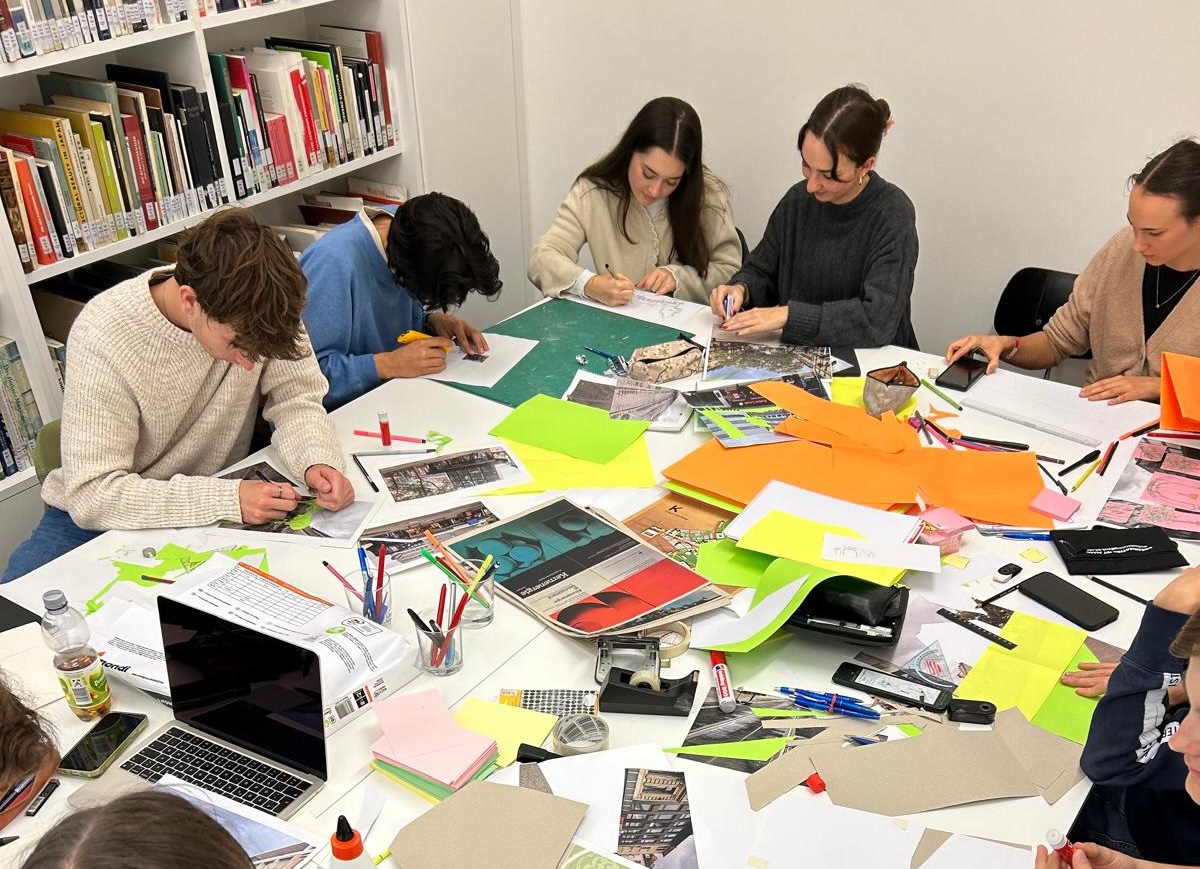BRASIL
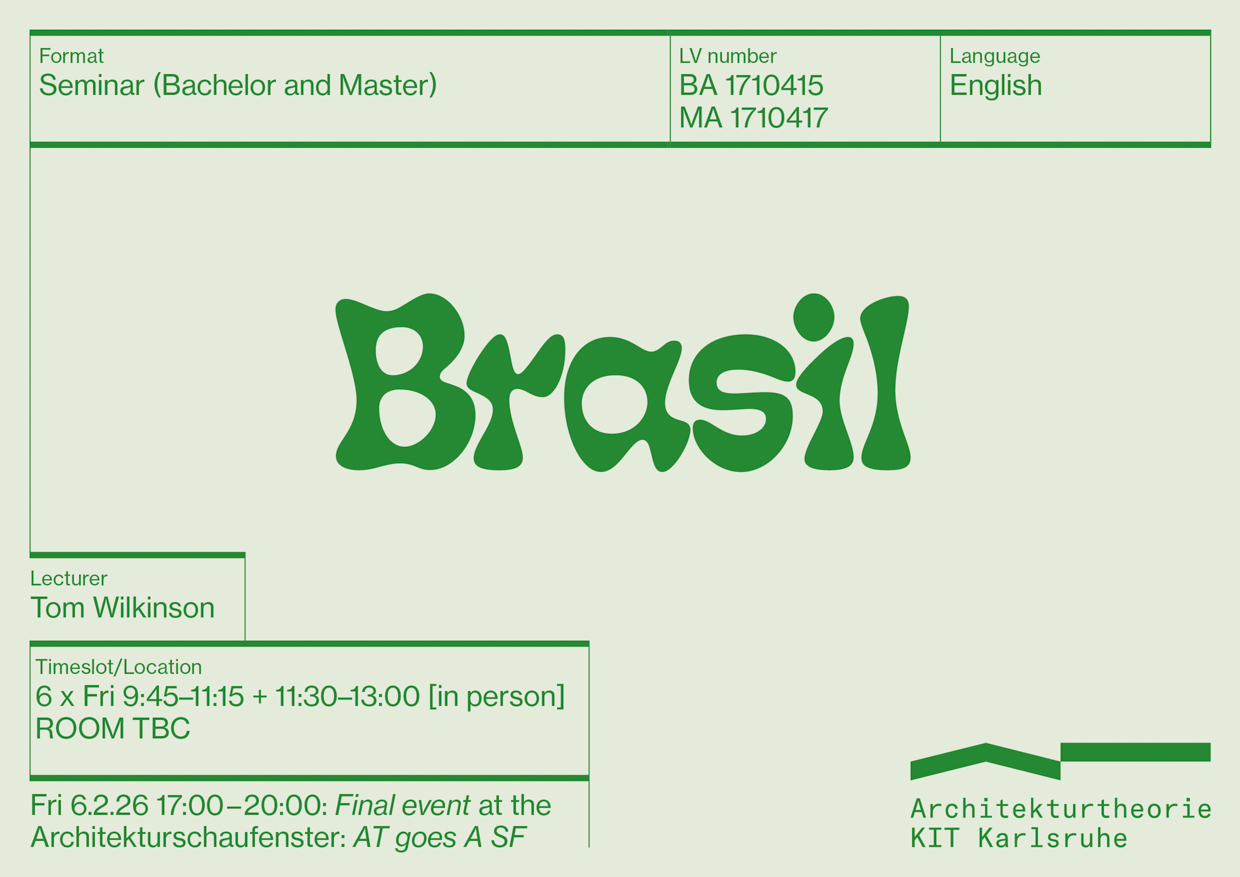
Tom Wilkinson
The theory and historiography of modern architecture, long focused on the global north, is beginning to be decentred. But one global south nation has always held a prominent role in this story, despite its supposedly peripheral status: Brazil. In this seminar, we will discuss the use of the nation as an epistemological category, models of relative development in architectural history, and the theoretical contributions that have developed out of Brazil’s very particular conditions: vast in scale and disparity, and shaped by colonialism, dictatorship, immigration and slavery.
LA
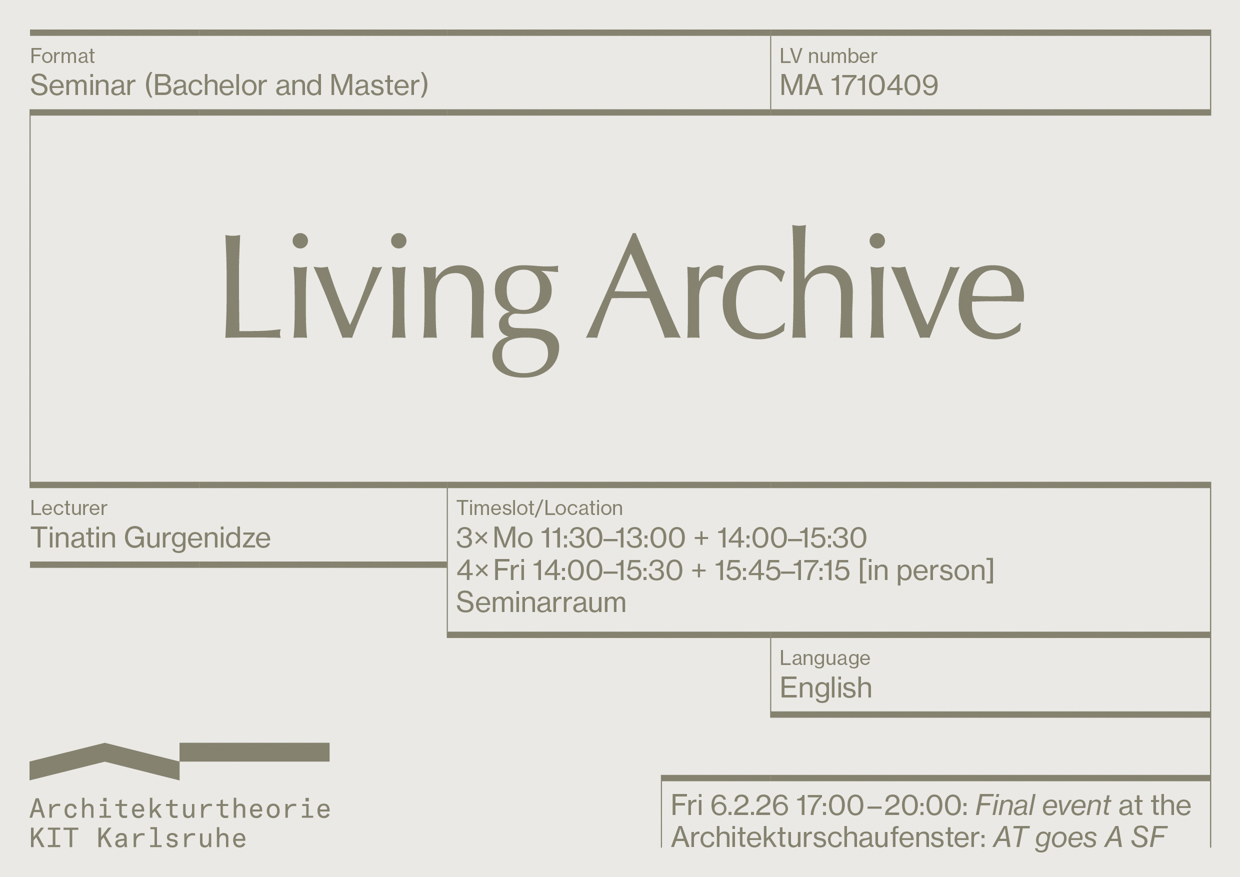
Tinatin Gurgenidze
This seminar will explore architectural elements such as façades, balconies, windows, and ground floors, viewing them not only as functional components but also as cultural, social, and political symbols. We will analyze how these elements acquire new meanings over time, reflecting local identities, economic conditions, and broader historical shifts.
The case study of Georgia is particularly compelling, as the collapse of the Soviet Union sparked a radical transformation of its built environment. The privatization of housing allowed residents to modify standardized housing blocks, leading to self-made alterations that continue to shape urban identity. By situating Georgia’s example within a broader architectural discourse, the seminar will illustrate how seemingly ordinary details can embody dynamic processes of change and serve as living archives of collective experience.
PD
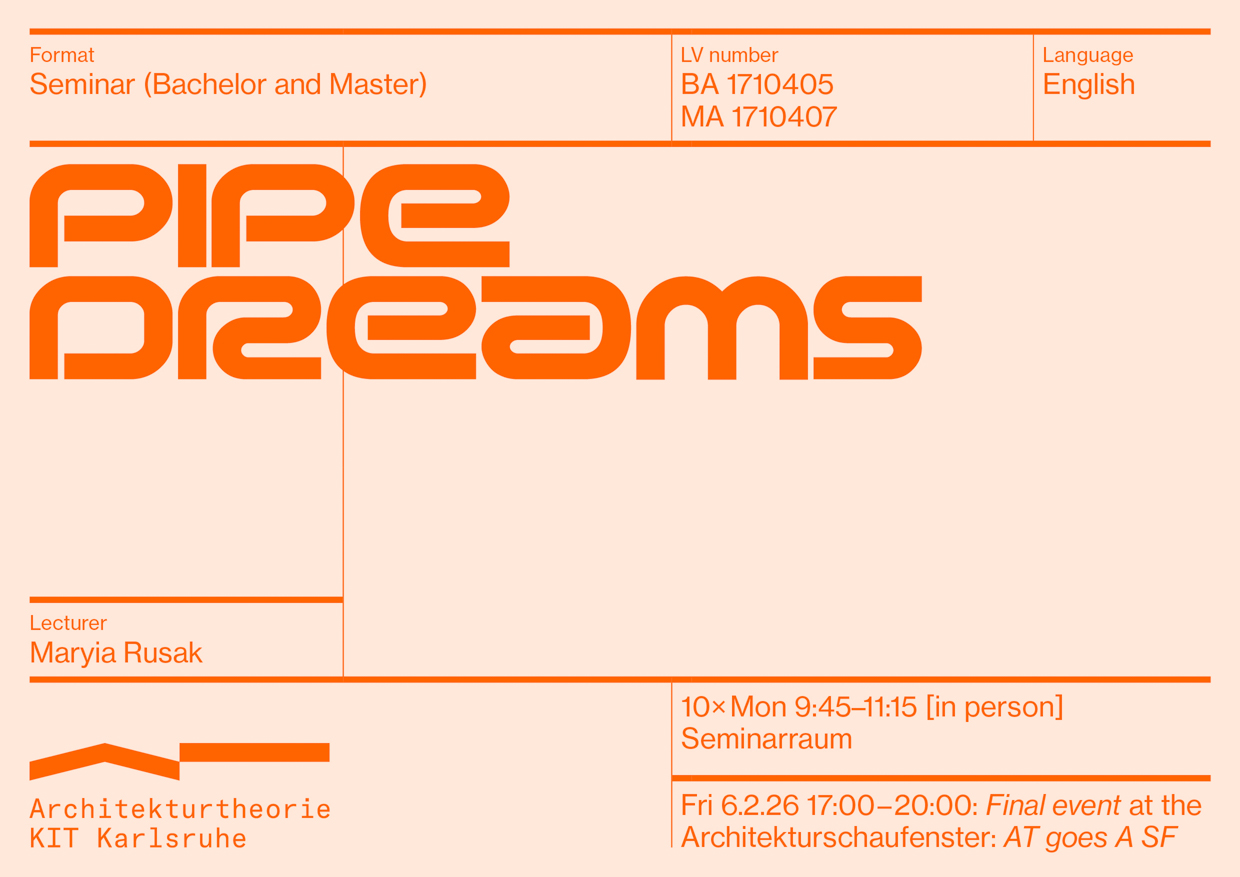
Maryia Rusak
While we often think of space as something abstract, it is shaped by a range of infrastructural systems. The seminar will investigate how existing infrastructural networks—roads, railways, electricity grids, oil pipelines, internet cables and waste systems—provide a concrete physical form to the abstract political idea of a united Europe. The seminar is particularly interested in the physical materiality of mundane infrastructural objects and their generative (and often violent) spatial effects.
During the semester, we will read key texts on the politics of infrastructure and investigate political imaginaries of selected systems. Karlsruhe, an envisioned European oil and data hub in the 1970s, will provide a helpful departure point. We will map the spatial impact of selected infrastructures and envision alternative futures more responsive to the contemporary climate emergency.
AOD
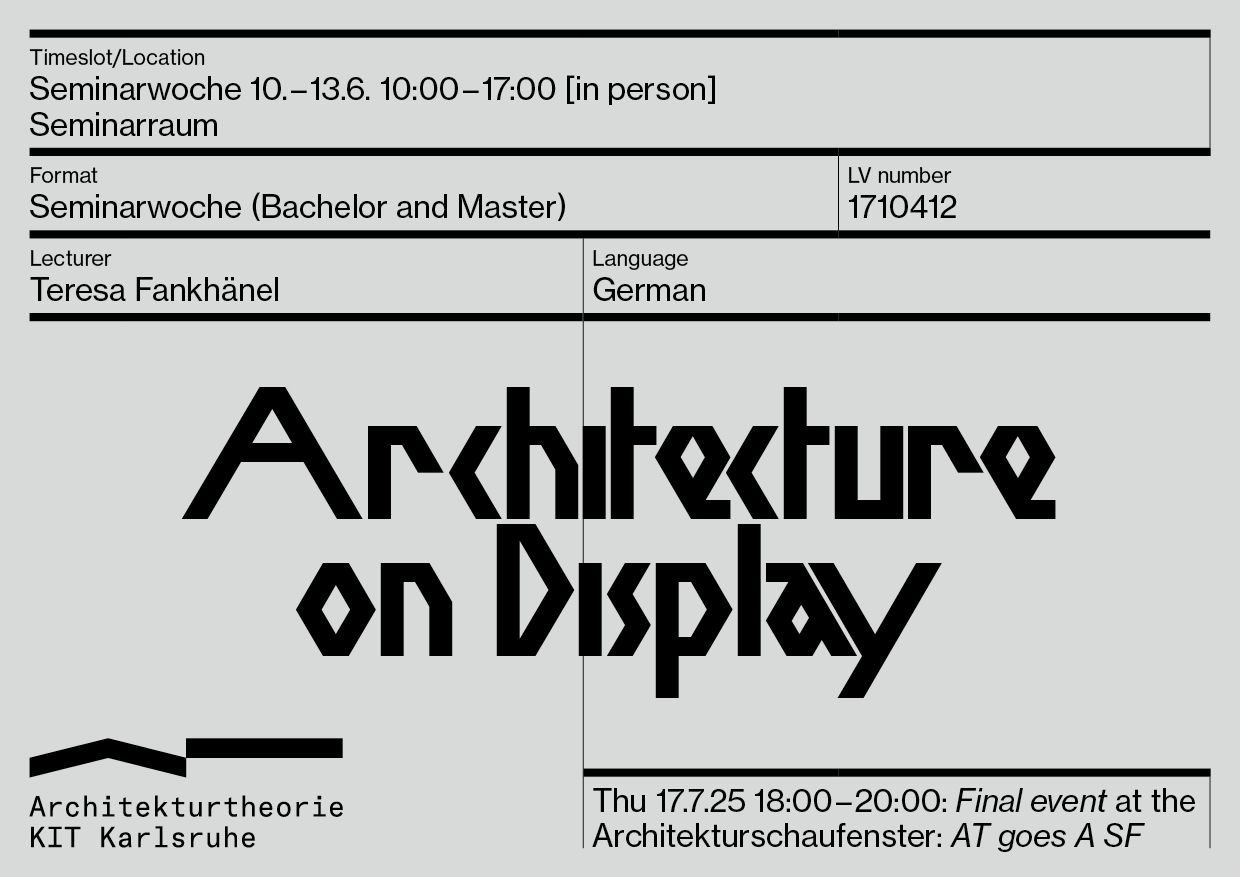
Teresa Fankhänel
What counts as architecture in an archive? This year’s Seminarwoche takes a close look at the large bequest of architectural children’s books held at the saai and examines them as physical artifacts, as bearers of architectural meaning, and as exhibits to be displayed.
Students will gain insight into archival and preservation practices as well as participate in a guided design charrette intended to develop a display strategy for architecture books.
MS
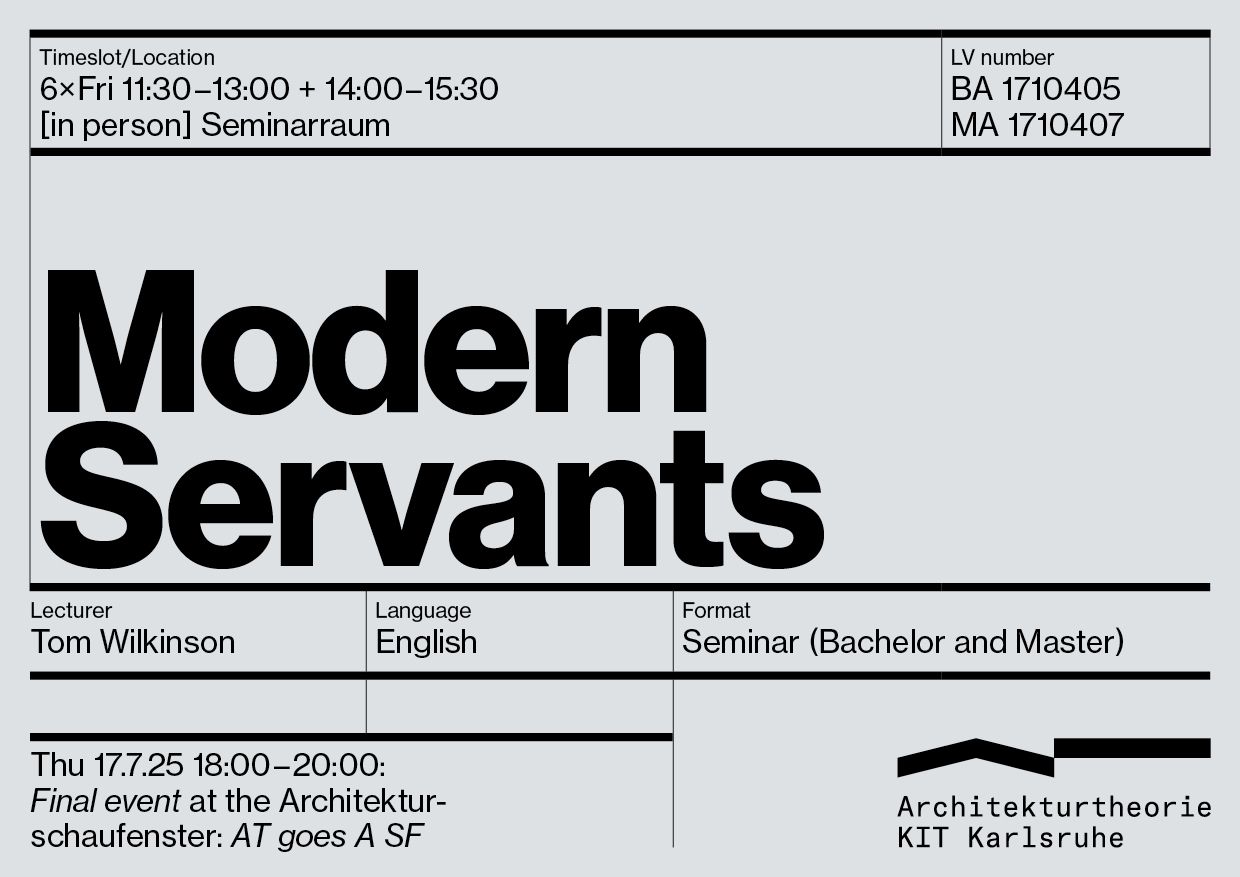
Tom Wilkinson
Modernist homes have often been presented as machines for living, in which new technology alleviates tedious housework. In fact they were run by servants, who were allocated concealed spaces within these buildings – a situation that continues today in many countries. Thinking about these spaces, and their historical roots in feudalism, patriarchy and slavery, allows us to ask intersectional questions about the labour that sustains modernist architecture, and about the illusions and contradictions of modernity itself.
AS:M
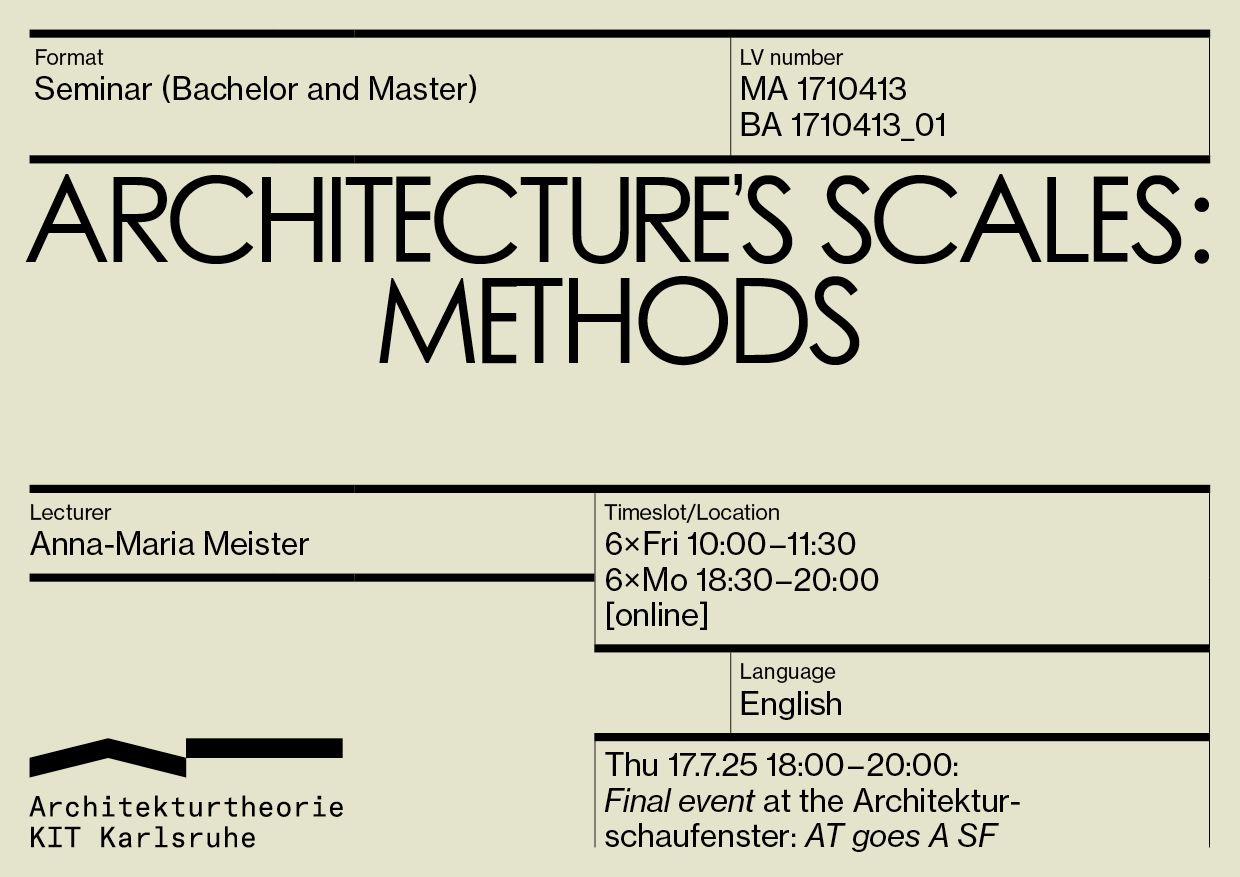
Anna-Maria Meister
While archival work provides the foundation for historical analysis, writing histories is the work of interpretation. How we write affects stories and narratives as much as what we write about. How is one to find and to interpret an “archive”? How does one add these missing stories, when conventional methods have failed to account for them? In this class, we will examine six methodologies: postcolonial studies; queer and feminist studies; alter-stories and new materialism; global histories and their critical revisions; geomedia studies; oral history and critical fabulation. Meeting in six double sessions, we will discuss texts that employ one of these methods, followed by an evening lecture and discussion with their authors. The seminar is taught in in hybrid format collaboration with Prof. Dr. Alla Vronskaya, Kassel University and the Kunsthistorisches Institut in Florenz - Max Planck Institute. It is open to Bachelor, Master, and doctoral students.
CC UE
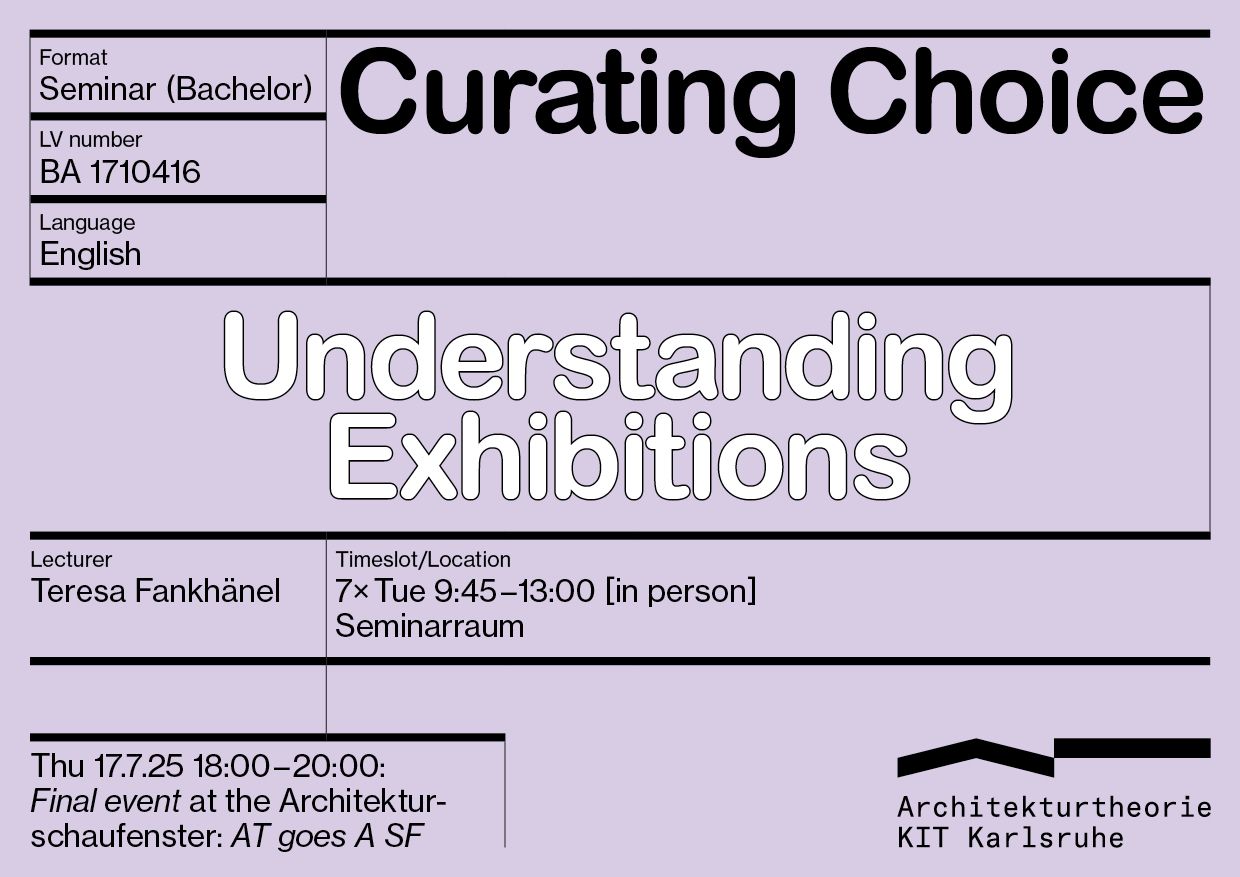
Teresa Fankhänel
Theory doesn’t always come in the form of written manifestoes or books. Often ideas are transmitted through other media such as buildings, photos or exhibitions. Architecture exhibitions have a profound influence on the way we negotiate the built environment. Deciphering their critical influence on architectural culture is a key skill in any architect’s tool kit.
In the previous semester we have looked at the canon of historical exhibitions, now we will study selected exhibitions through detailed analysis and take a guided tour through some of the keys aspects that influence the creation of exhibitions. We will analyze spatial techniques such as rhythm and sequence in installations, visual strategies such as sightlines and organizing systems as well as curatorial concepts and visitor experience through a closer look at selected exhibition floor plans, elevations and written documents.
PAB TATOA
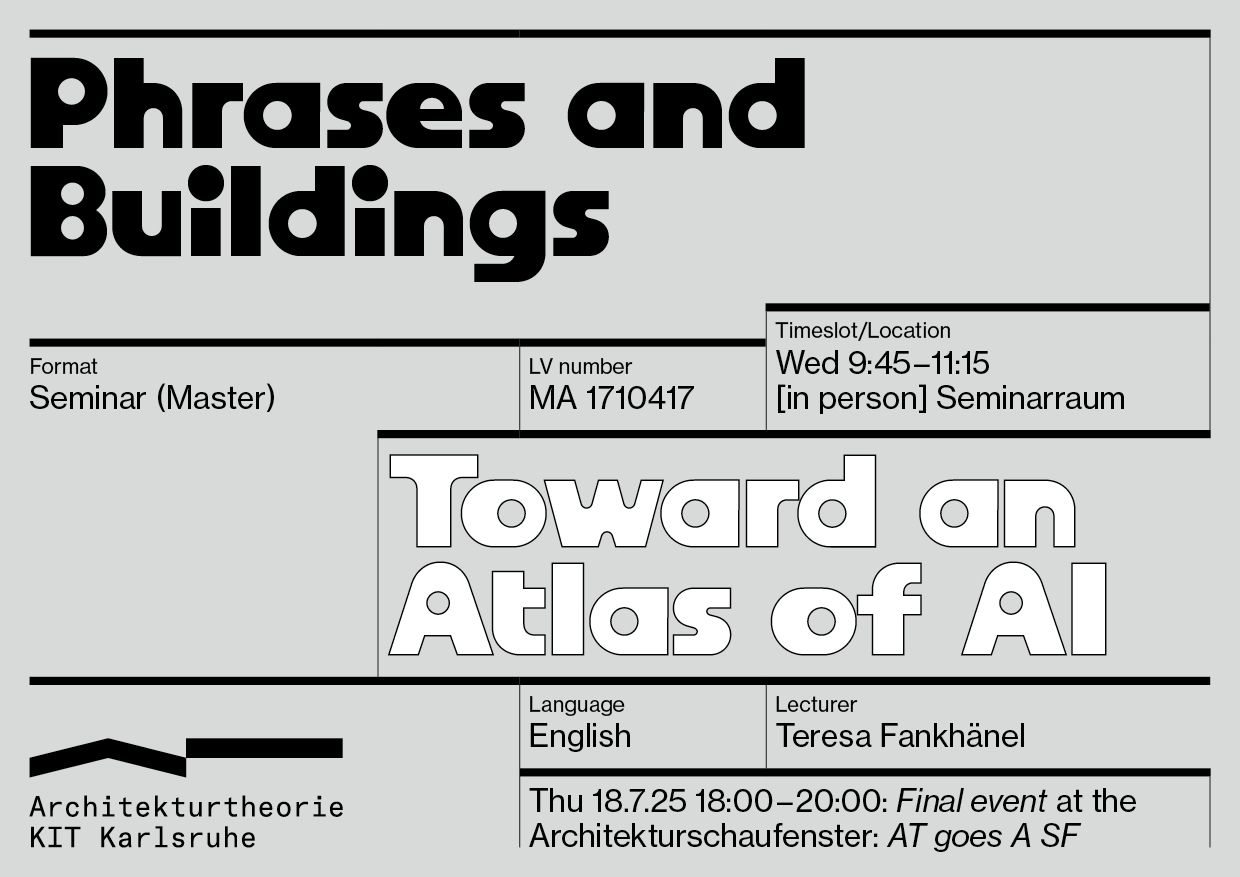
Teresa Fankhänel
With Large Language Models (LLMs) computers have learned to mimic human speech. Unlike in humans such learning only happens with the help of preexisting vast collections of processable data, be it in the form textual sources or images, that allow an extrapolation of similarities and conventions. To draw meaning from such databases of precedents—to learn—machines employ techniques created by humans. Ordering systems such as tags, lists and comparisons are inherently governed by the use of language, from metadata to automatically derived alt texts.
This workshop seminar, held in conjunction with the preparation of the exhibition “City in the Cloud, Data on the Ground” at the Munich Architecture Museum, opening October 2025, will explore the role of human language as a descriptor in architecture.
P&CS
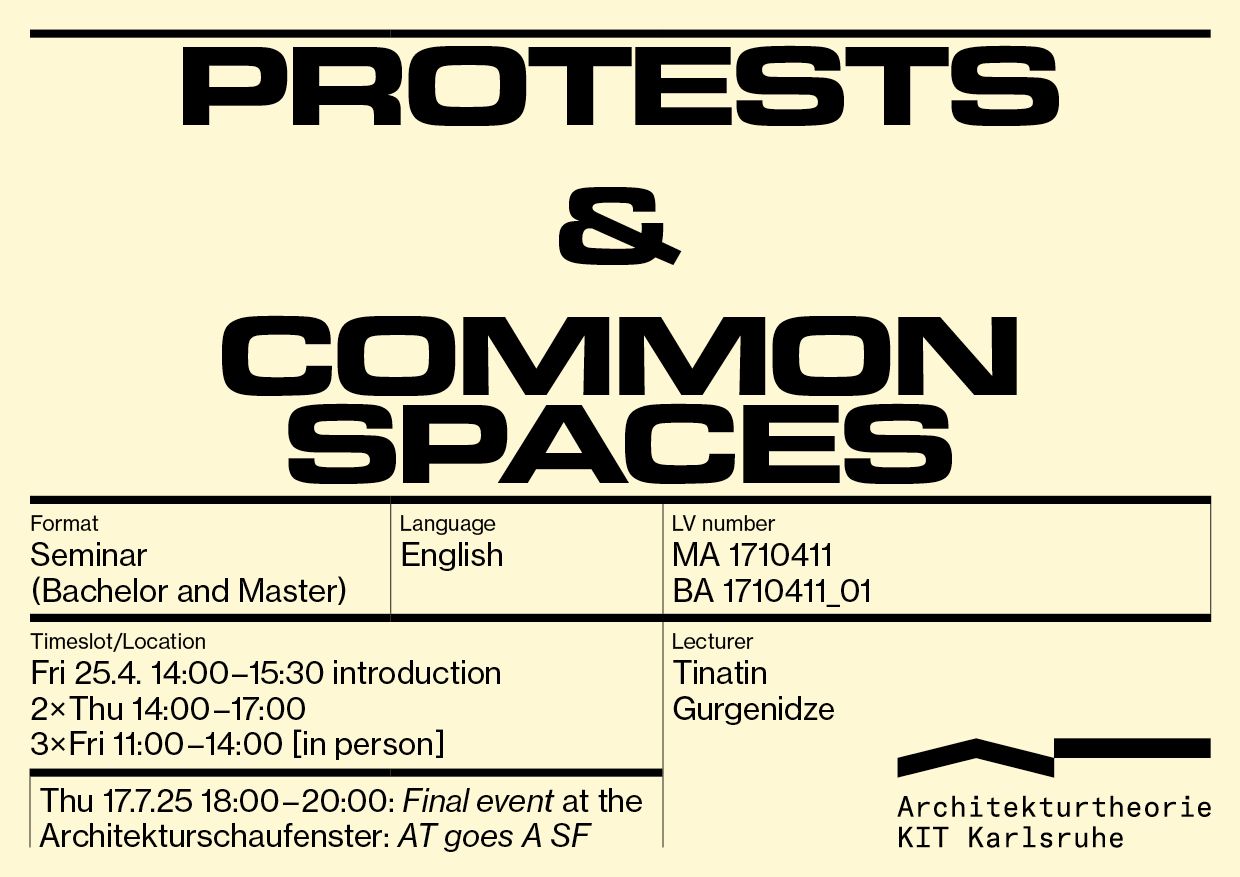
Tinatin Gurgenizide
Recent waves of public protests around the world have not only reshaped political discourse, but also changed the physical and social landscapes of urban spaces and the way we perceive them. This seminar explores the phenomenon of protest architecture and its role in reclaiming urban spaces as platforms for solidarity, dialogue and collective action. We will examine protest sites with temporary structures, including makeshift shelters, communal kitchens and spontaneous performance spaces. These spaces are examined for their potential to challenge neoliberal urban fragmentation and privatization, and the analysis is supported by a review of the ongoing protests in Tbilisi, Georgia and past protests in the last decades like Gezi Park in Istanbul, Tahrir Square in Cairo and Maidan in Kyiv.
DIN FT
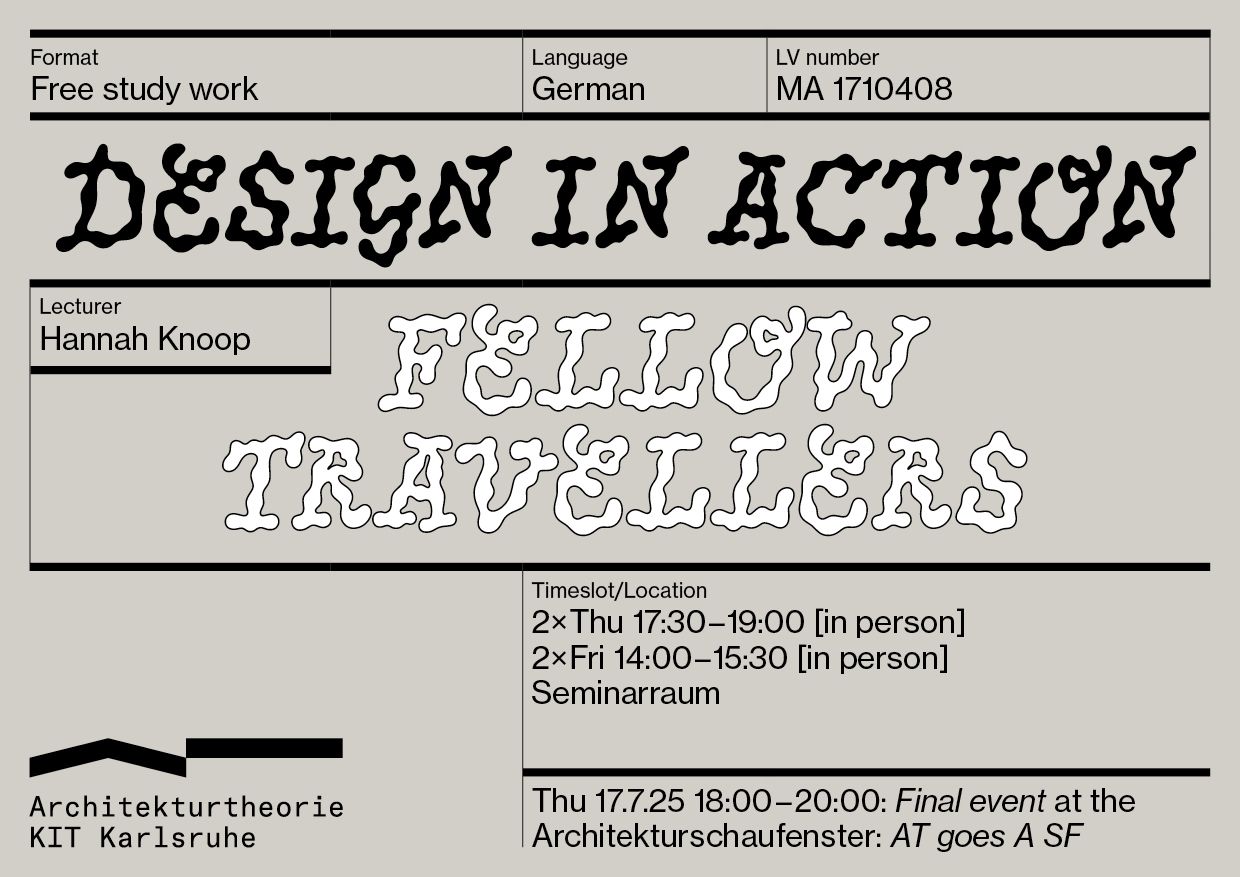
Hannah Knoop
In previous courses, we have worked intensively on analysing crises and challenges - now our focus is turning towards solutions! With Design in Action, we examine concrete approaches to social change, inspired by cultural theories (including Bruno Latour) and the "Fellow Travellers" exhibition at the ZKM.
The exhibition shows how artists, scientists and communities around the world are trying out new ways of living together. It is not just about criticism, but about action: about networks beyond traditional centres of power, about projects that actively shape the environment and society.
The free study work consists of two discussion sessions and two joint museum visits, during which each student looks at an object in depth.
AG
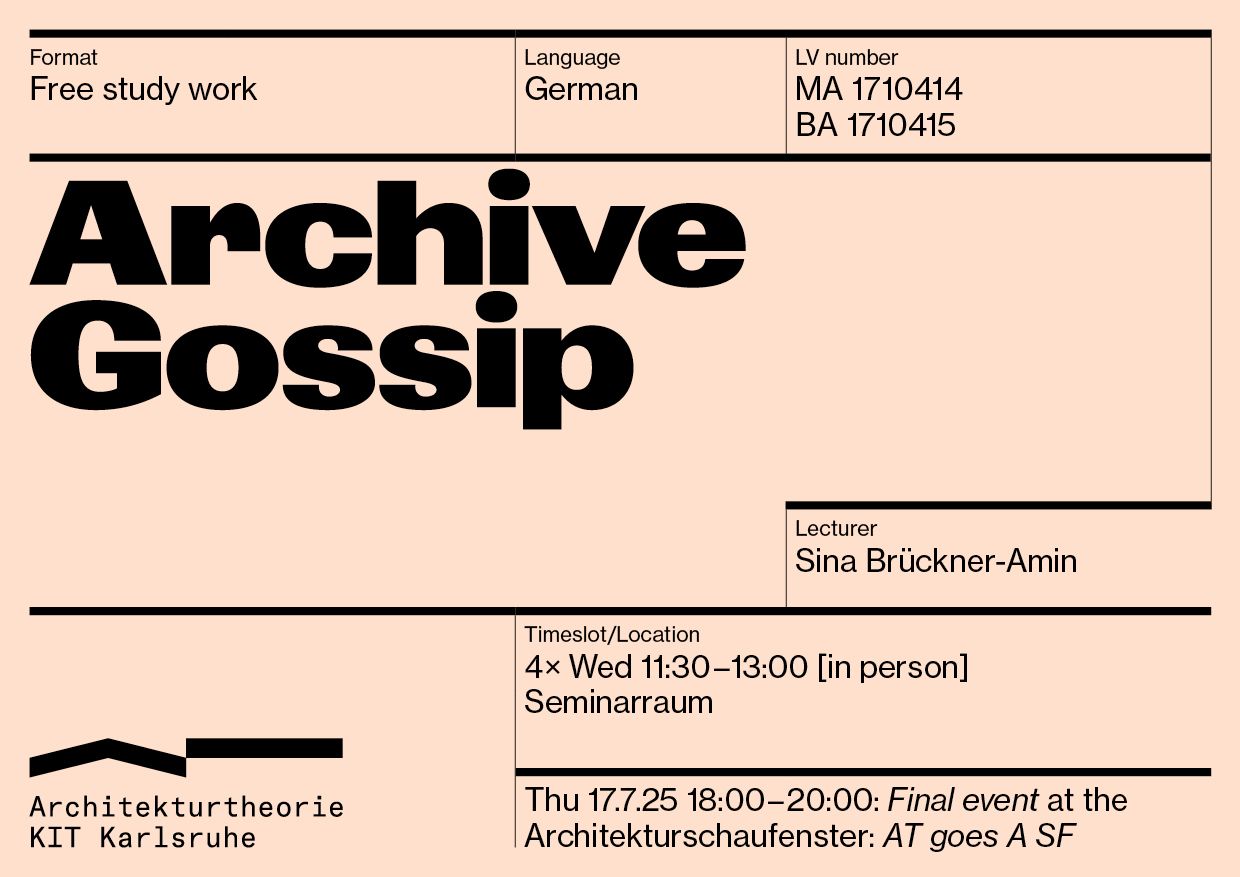
Sina Brückner-Amin
In search of “Archive Gossip,” we explore the saai archive. On the basis of selected materials, we dedicate ourselves to little-explored stories and protagonists. The result includes the production of a podcast episode. We question the critical potential of gossip: Fragmented sources are constructed as stories only with a little speculation, but how do we deal with these gaps in knowledge?
To tackle this, we read texts about the archive as a place of knowledge construction to understand how information is stored in things and how it can be read out again. We want to ask productive questions of archival materials and architectural media and, building on that, tell exciting and accessible stories.
AD
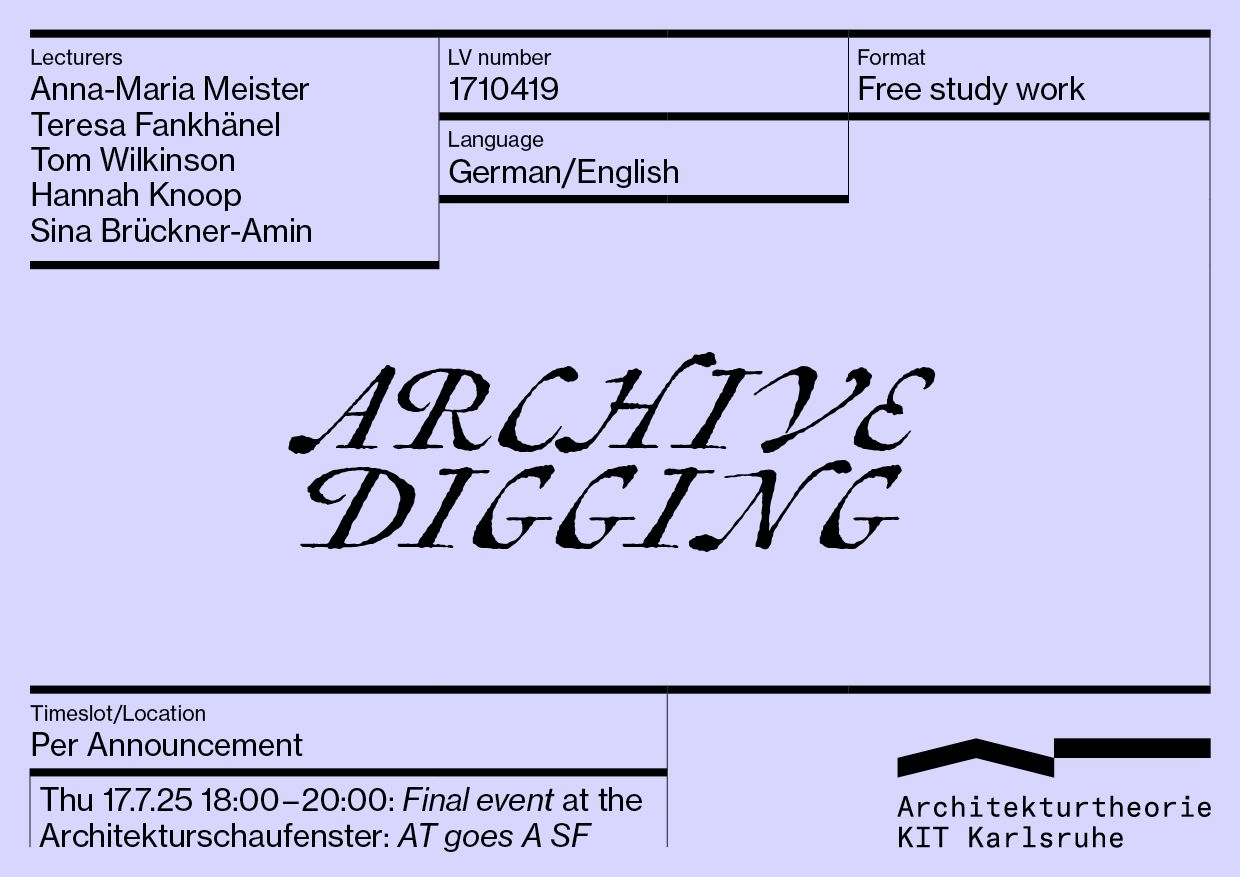
Anna-Maria Meister, Teresa Fankhänel, Tom Wilkinson, Hannah Knoop, Sina Brückner-Amin
The saai archive is one of the largest German architecture archives - and, like many archives of its kind, it is full of unexplored estates and missing items and voices. In an independent research project, questions can be investigated that deal with people, projects or archive strategies. Who taught what exactly at KIT when it was not yet called that? Which ephemeral architectures have already existed in Karlsruhe that disappeared without a trace? Who made a drawing and why is it damaged? For these and other questions the archive is open for digging together with the saai team.
TITTS!
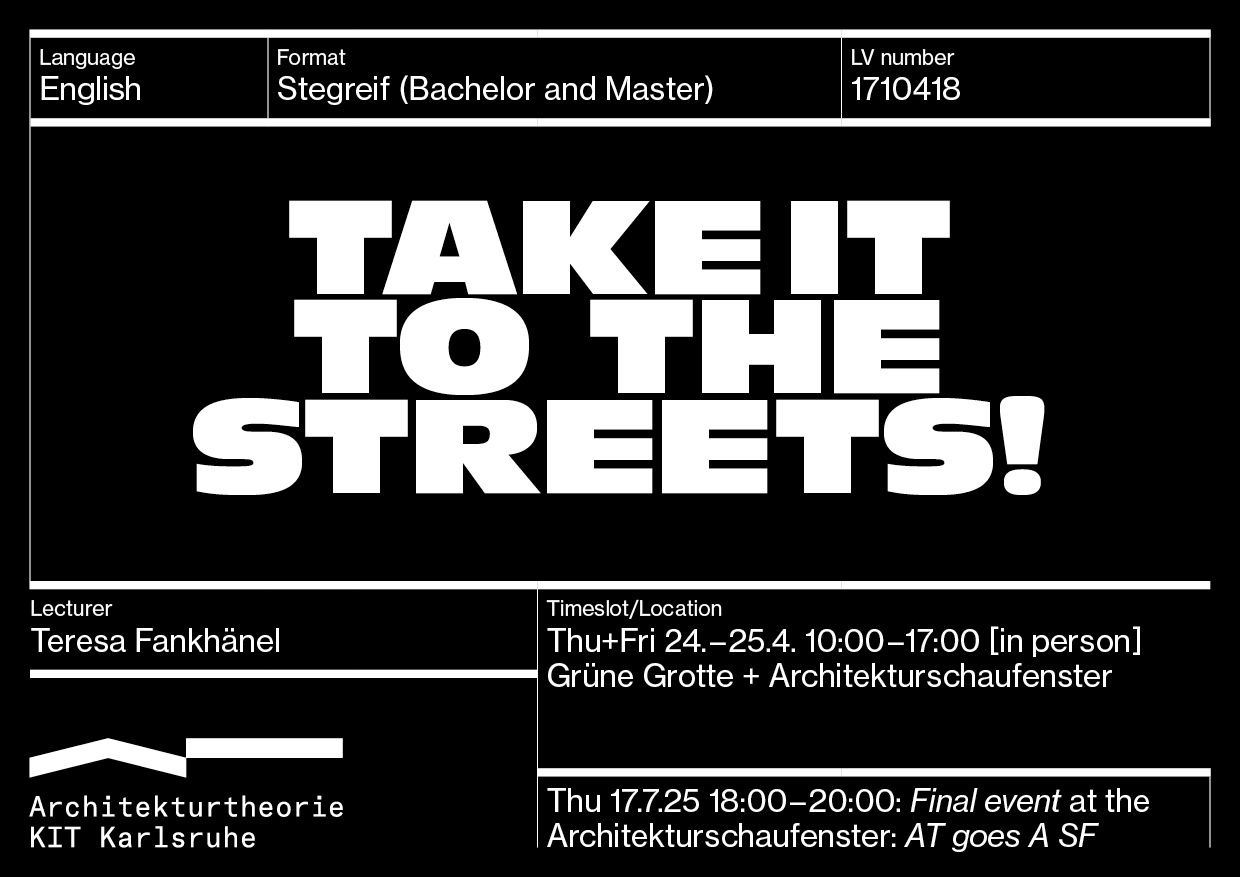
In contrast to architectural photography, the perfectly staged, over-aestheticized building is not the center of attention in street photography. It addresses the city in its everyday appearance and in the interaction with the people who move around in it. The Stegreif, in collaboration with the Karlsruhe Architekturschaufenster, invites students to take their very own look at the city.
CA
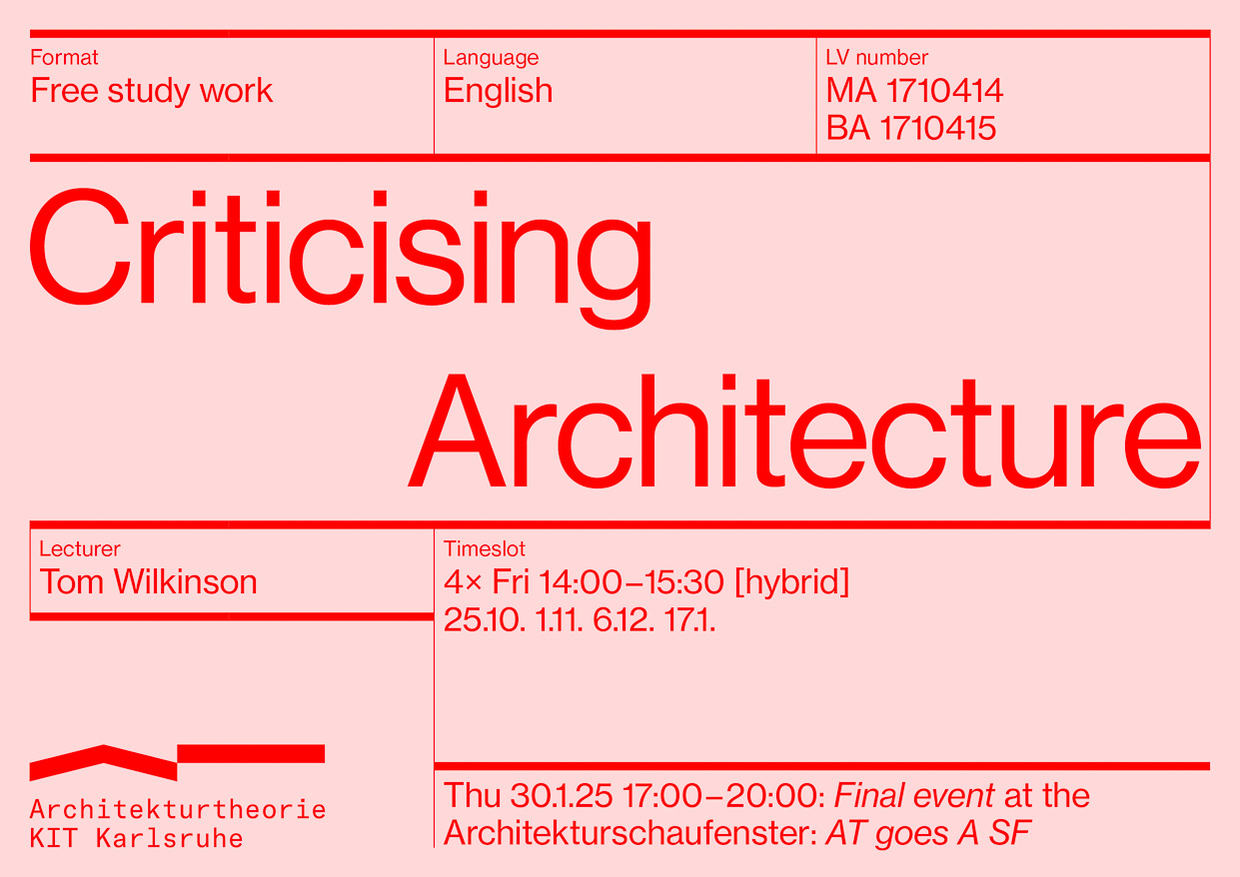
Tom Wilkinson
In this research seminar we will consider the role of criticism in architecture: what it means to be critical, how criticism functions as a professional practice, what relationship criticism has to design, and what criticism can do today. We will read and analyse some key examples, as well as some theoretical reflections on the form, and then produce a short piece of criticism ourselves.
CMBI
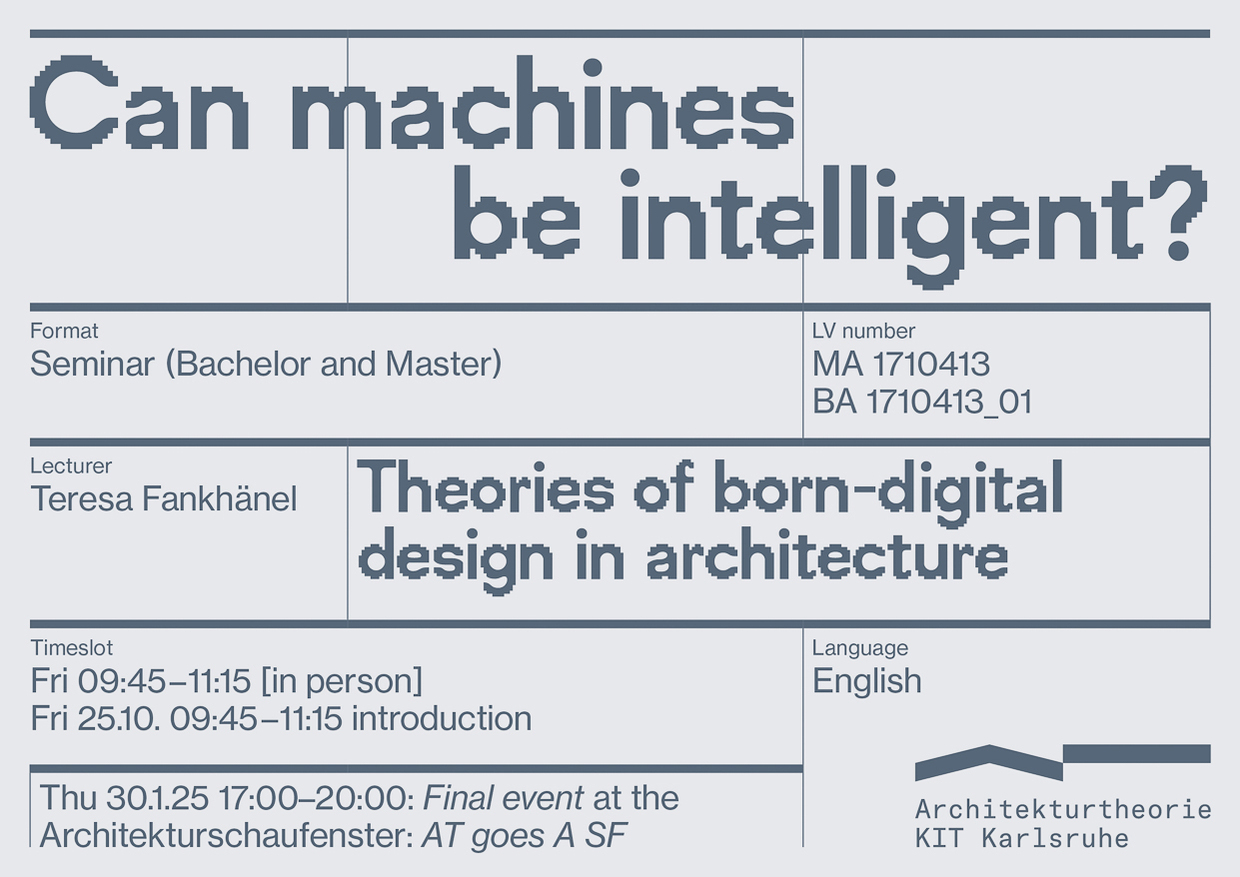
Teresa Fankhänel
Where is architectural design headed in a rapidly changing age of proprietary software empires, artificial intelligence, and virtuality? This seminar pulls back the curtain on the origins of today’s born-digital design philosophies and their influence on architectural thinking: from participatory design and intelligent computational design assistants to an expanded field of generative geometries to the emergence of web-based interactive platforms. Key texts and select case studies from the 60s until today examine the influence that software, computers and the internet have on the design of architecture, and architectural thinking in society at large.
ExA
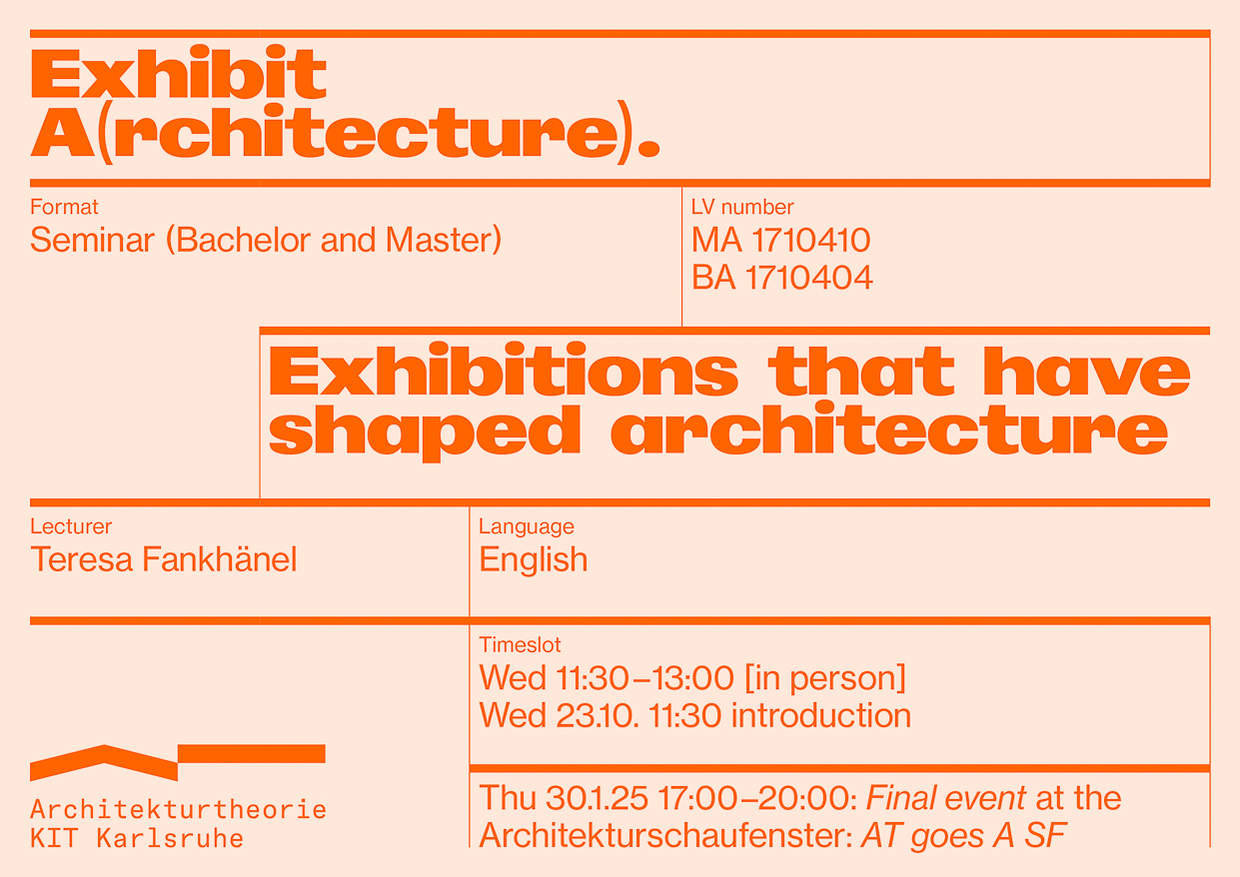
Teresa Fankhänel
Theory doesn’t always come in the form of written manifestoes or books. Often ideas are transmitted through other media such as buildings, photos or exhibitions. Deciphering their critical influence on architectural culture is a key skill in any architect’s tool kit. Architecture exhibitions have a profound influence on the way we negotiate the built environment. While some have been credited with initiating whole movements (International Style, MoMA, 1932 or Venice Biennale, 1980) others have secured a lasting legacy for individual architects by inscribing them into the canon of great architecture. This seminar unpacks a select number of exhibitions that have shaped architecture’s relationship to styles and fashions, technological advances, the relationship of humans to nature, nationality, culture and globalization, the individual’s place in society, and our relationship to history.
LA!
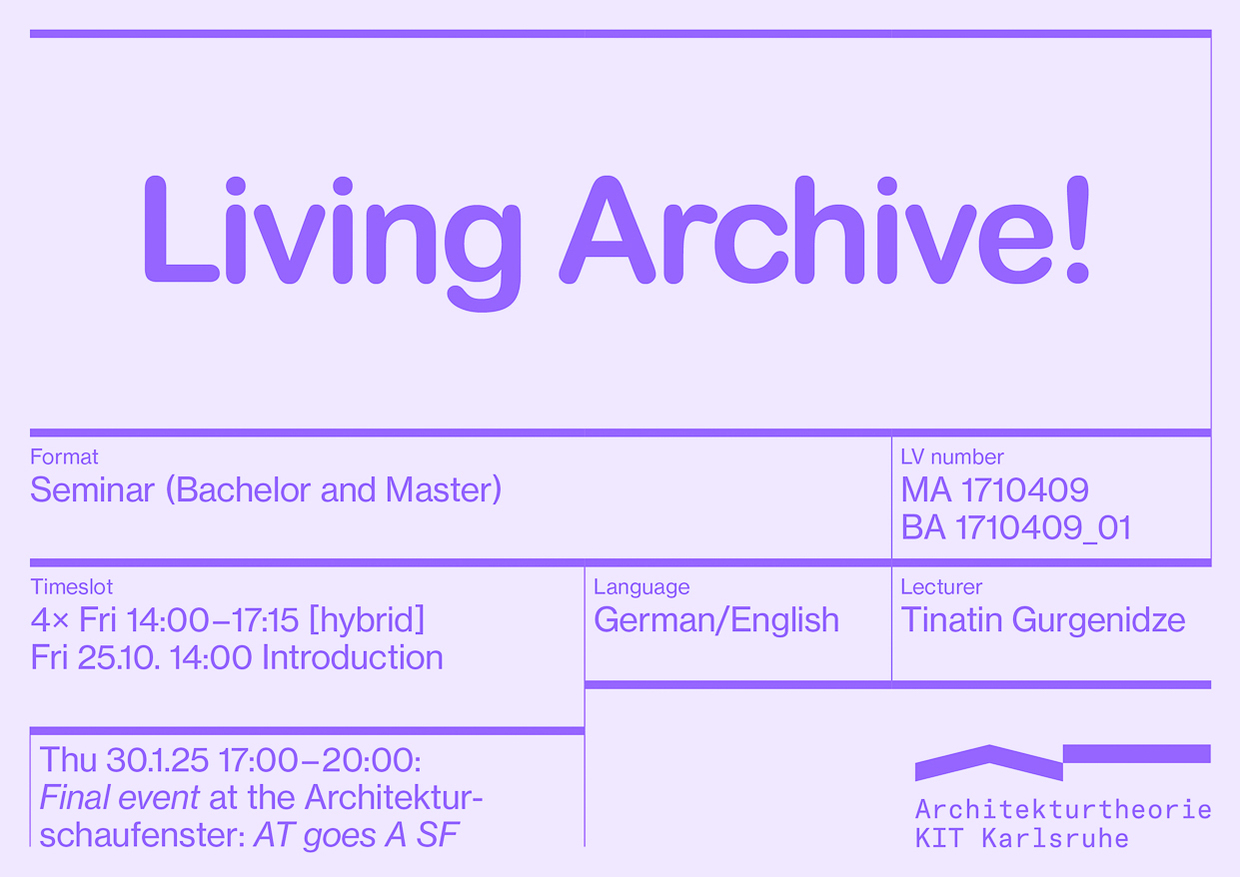
Tinatin Gurgenidze
This course explores the transformation of the Panel Block Housing in the transition period from a planned to a market economy in post-Soviet Georgia, primarily from the late 1990s to the early 2000s. The emergence of new architectural elements within post-Soviet contexts is a compelling area for investigation. This involves documenting a 'living archive' by visualizing and analyzing the various typologies of these transformed spaces. Of note are the existing typologies of self-built structures, like balconies, ground floors, extensions, and garages, to mention a few, which serve as a tangible record of the architectural evolution of the period for professionals. The planned course aims to meticulously research the "living archive" and analyze and document them.
RBT
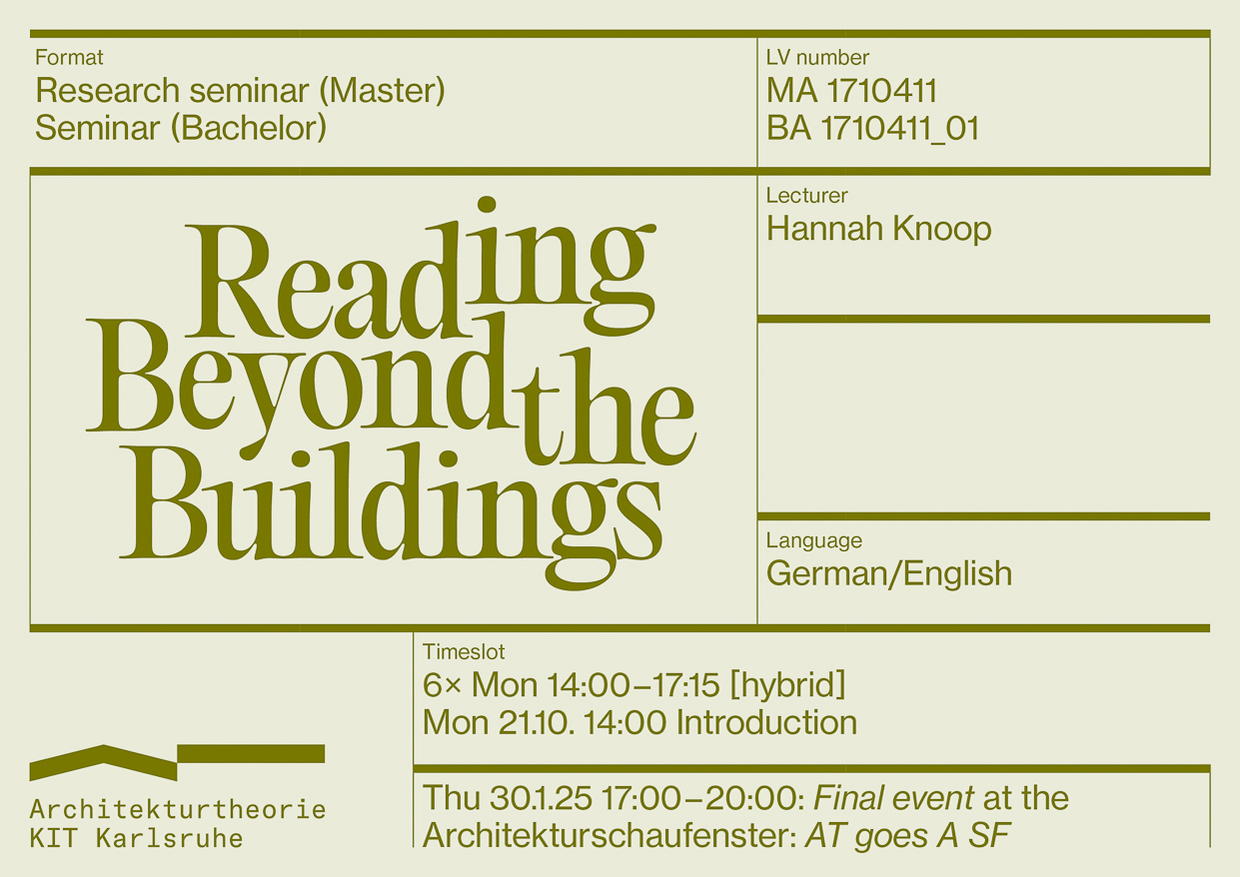
Hannah Knoop
Architecture and urban space are part of an infrastructure for political participation and legal citizenship, such as through the organisation and aesthetic impact of public space and cultural and political institutions. After the Second World War, the discipline of architecture was given the task by the United Nations of not only solving housing problems, but also having an impact on international relations. This also marked the beginning of an examination of architectural spaces of colonialism, human rights violations or discrimination. How was and is the discipline involved or responsible? What positions does it adopt today? In this research seminar, we want to read, discuss and research ‘beyond the buildings’ based on texts from architectural theory, political science and post-colonial studies.
R:IKL
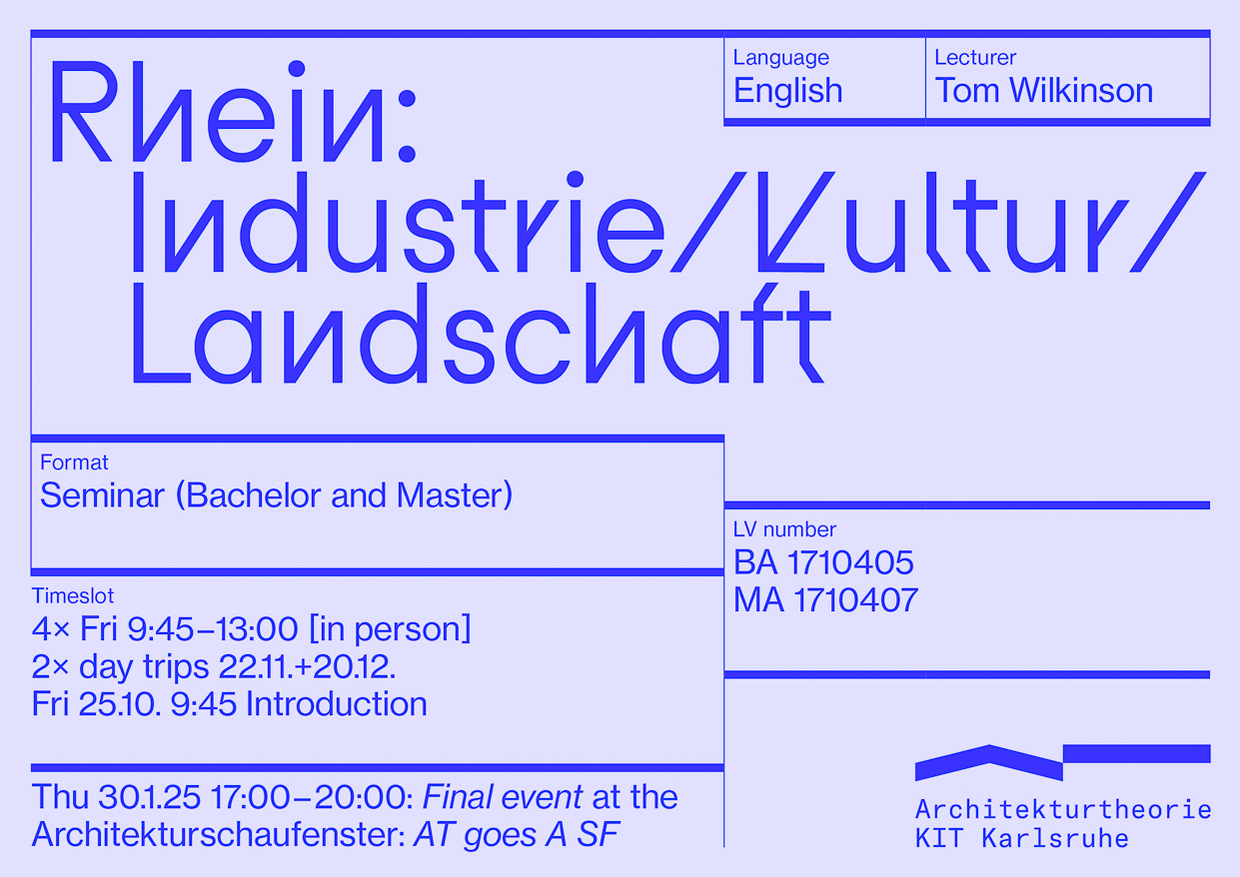
Tom Wilkinson
The Rhein is one of Europe’s most important rivers, a vital economic route transporting people and goods between major cities, a geographical feature joining and dividing the continent– and the world. It is also a cultural landscape that played a central role in the development of the modern German identity. However, the modern river is hardly natural at all, thanks to canalisation – it is, in effect, one of the world’s biggest infrastructure projects. Since the industrial revolution, it has also suffered from serious pollution, and now climate change threatens to render it unnavigable. In this research seminar we will visit key sites and read texts from poets, designers, philosophers, and geographers, using the Rhein and its architecture to explore bigger questions about nature and design, economics and culture.
AT goes A SF
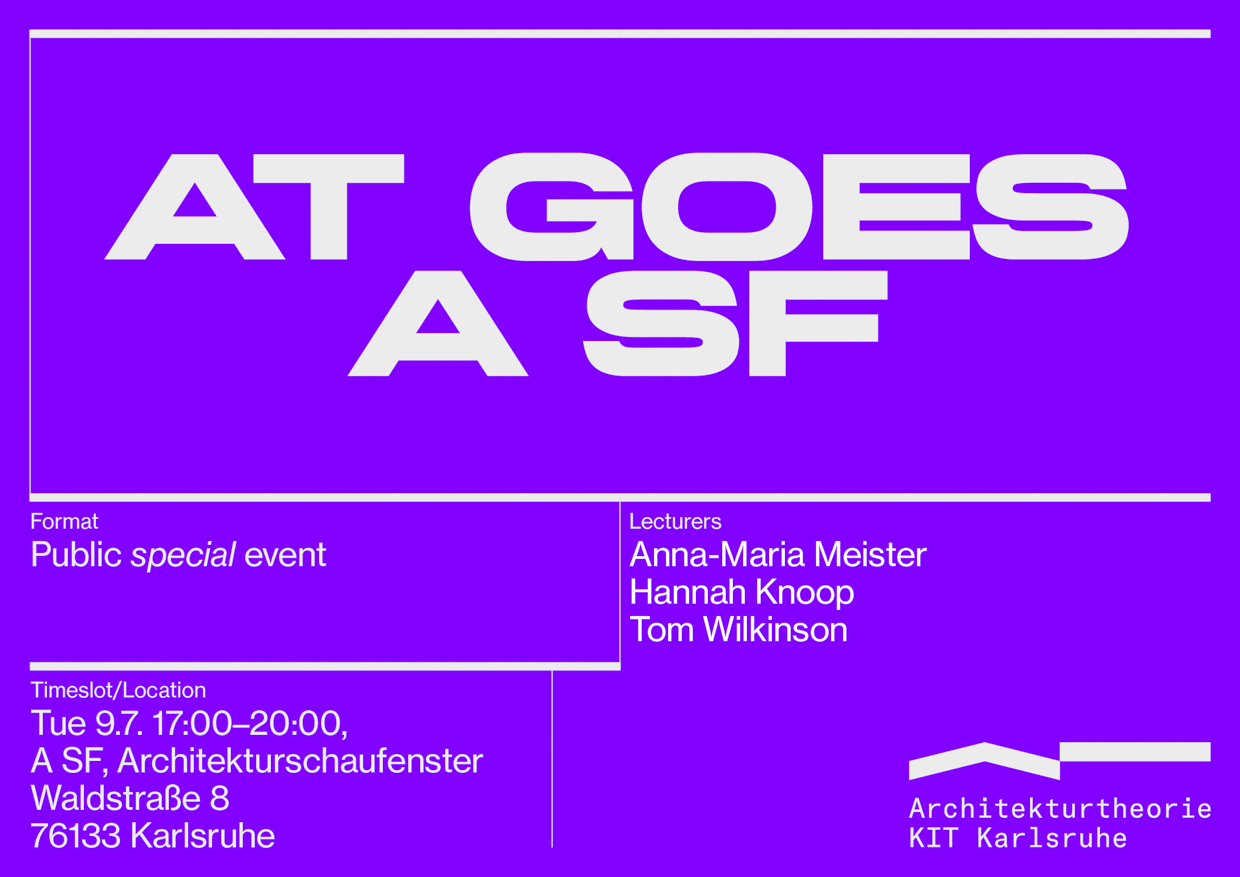
Anna-Maria Meister, Hannah Knoop, Tom Wilkinson
We want to make architectural theory more tangible by exhibiting it, discussing and presenting it in Karlsruhe's urban space! To this end, we are once again inviting you to the Architekturschaufenster for "AT goes A SF": an evening in which we want to discuss insights, questions and ideas from our courses with students and guests. We move through diverse scales, categories and contexts: we will work on key terms of architectural theory, read critical theory, examine the different scales of architectural objects, examine the culture of bathing facilities, analyse architectures of political decision-making and visit the Federal Court of Justice, and, while "annotating" another study trip live in Italy, we will look into Florentine archives. In doing so, we understand architectural theory as a unifying critical practice – and look forward to a lively exchange!
ADM
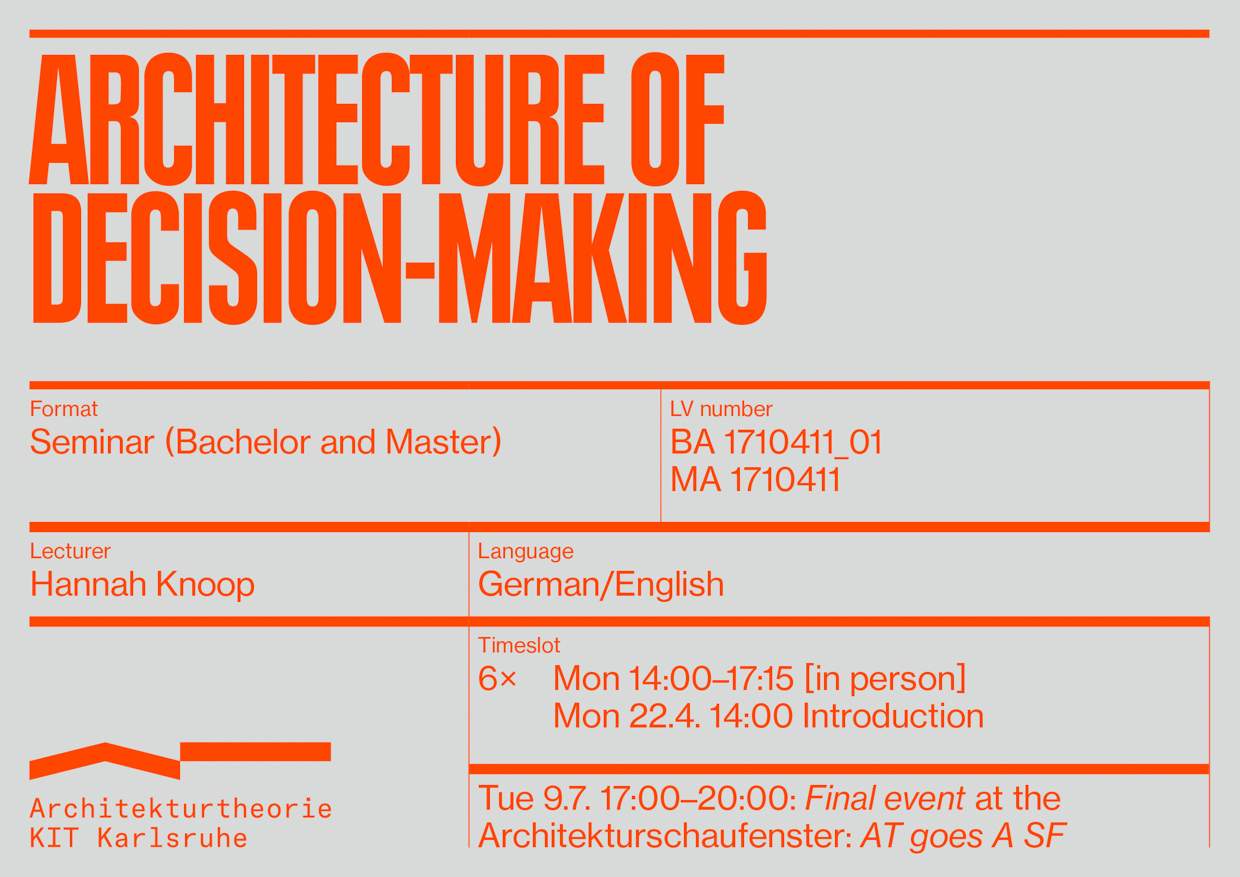
Hannah Knoop
Façades, portals, and assembly halls are architectural symbols of political decision-making and power. But utility rooms, furniture, and room layouts are often overlooked. Yet it is precisely in long corridors, at round tables or in front of fixed television cameras that politically significant decisions are discussed, agreed, and announced. How do these spaces and objects correlate with political systems? What power can emanate from them? These and other questions will be discussed with the help of architectural theory texts on power and architecture, the analysis of case studies and a Stegreif-Design.
The course is designed as a reading and research seminar. The Stegreif (MA-Arch) is mandatory.
Take a Seat and make your Decision comfortably!
ASO
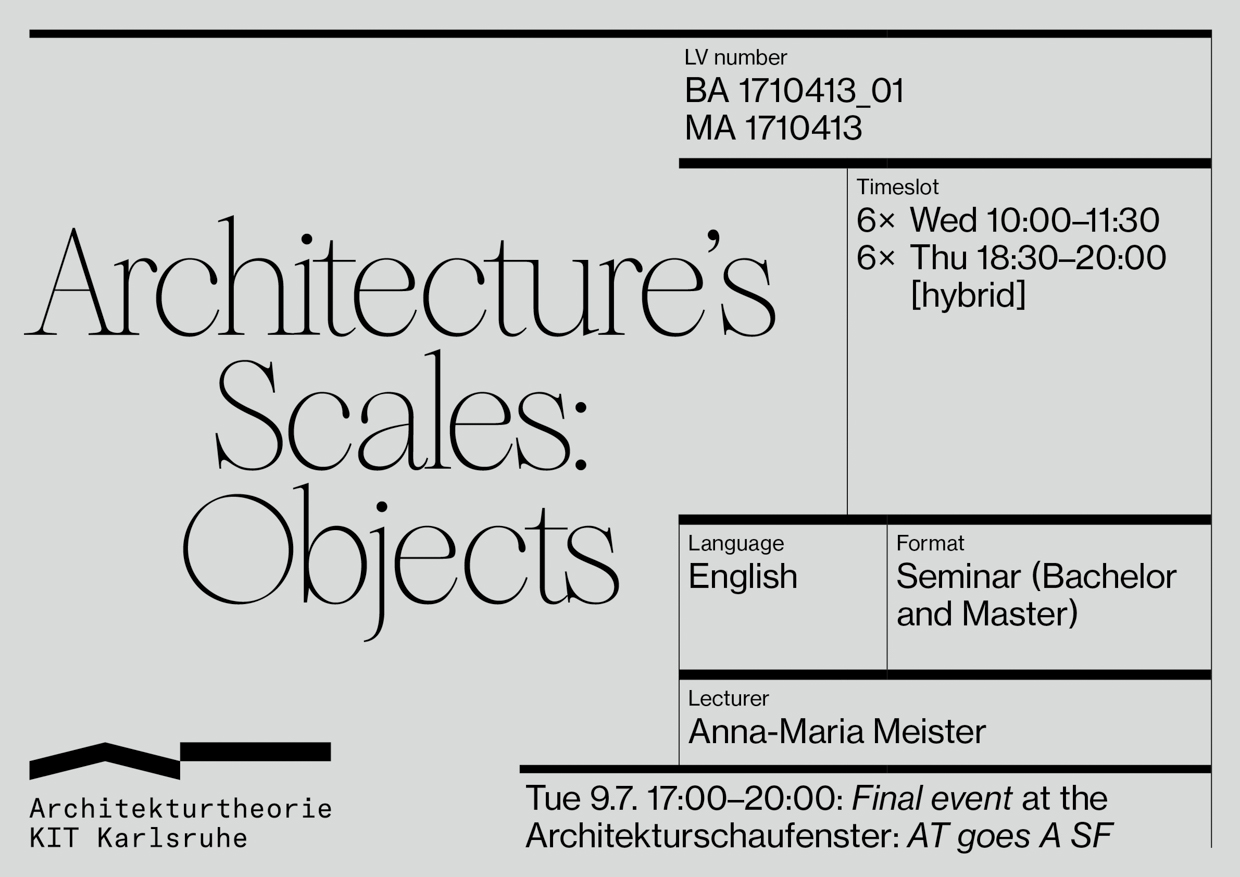
Anna-Maria Meister
The scales of architecture are not limited to buildings, nor is the impact of architecture. Rather, built environments are configured by architectural objects of different scales: from molecular particles to buildings, cities or even abstract ideas, by the human bodies that build and sustain them. In this seminar we will ask what makes architecture an object. To this end, we will examine six case studies of different scales - from the development of standardized objects to the question of the objectification of architecture as a "gift". The seminar will be taught in collaboration with Prof. Dr. Alla Vronskaya, University of Kassel, and the Kunsthistorisches Institut in Florenz - Max Planck Institute. Meeting together biweekly (connecting online to the other group), we will discuss a text by a leading contemporary scholar, followed by an evening lecture and discussion session with the author.
BS
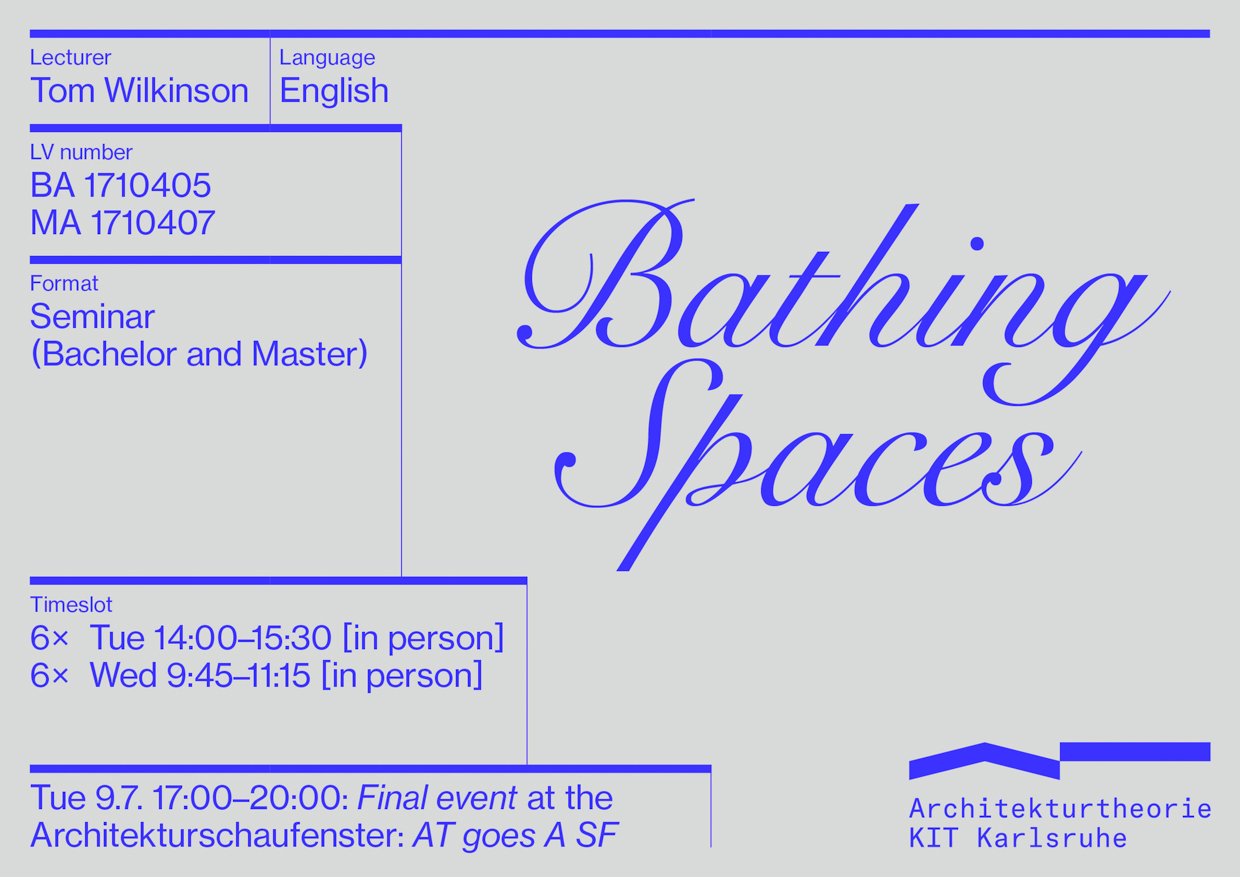
Tom Wilkinson
Humans have always built bathing facilities, whether for religion, pleasure, hygiene, or sport. In this seminar we will consider examples from many times and places, from pre-Columbian America to modern Tokyo, gay saunas to Olympic pools. We will also read a variety of texts, including theological, phenomenological, and Foucauldian theories of the body in space. Bathing spaces can be democratic (hence the Russian saying, ‘there are no epaulettes in the banya’), but they can also exclude groups like women, the disabled, and the racialised. The unusual nudity of the pool brings social tensions to the surface, while offering a vision – which may be a mirage – of a radically equal space.
AILA
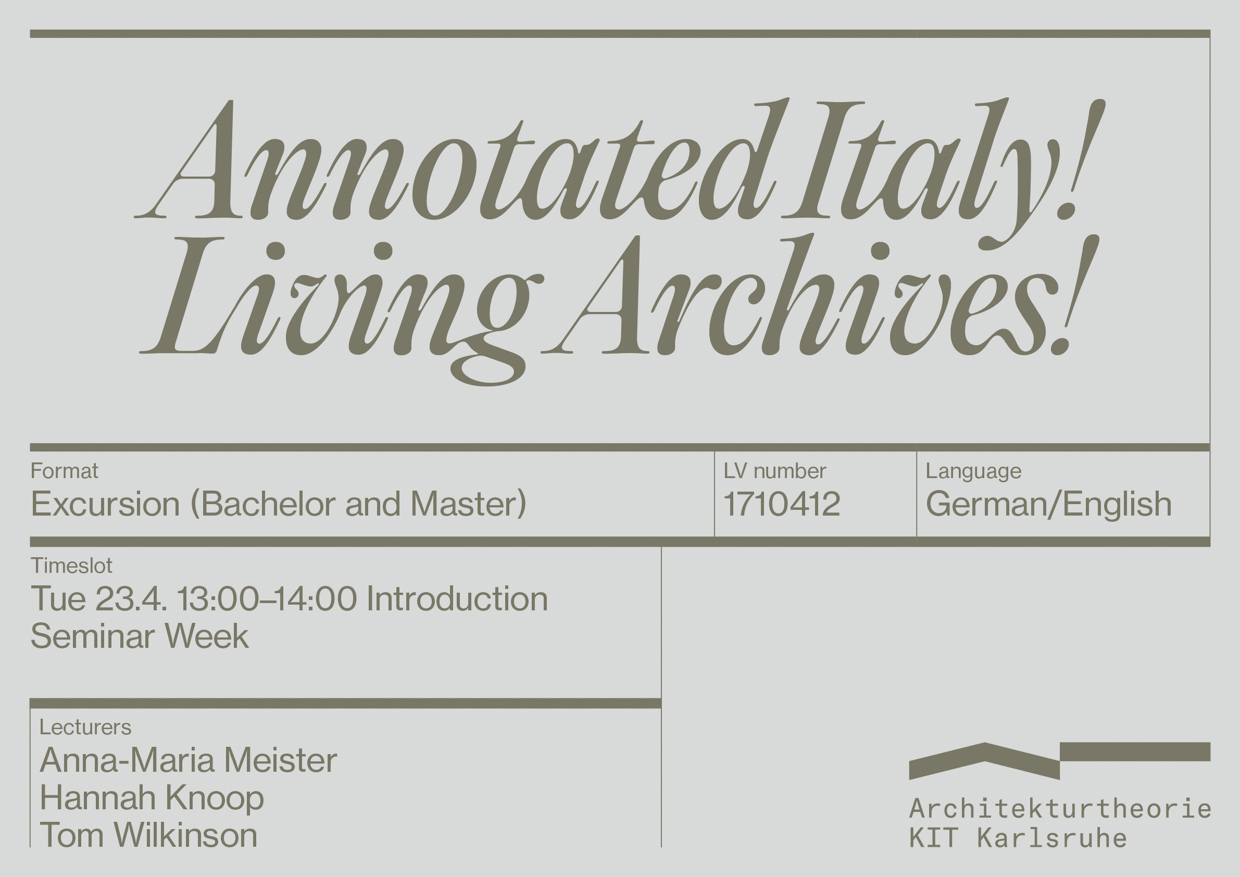
Anna-Maria Meister, Hannah Knoop, Tom Wilkinson
In a historical overlay, we will re-enact and annotate a KIT excursion to Italy from 2002 during the seminar week. Using original slides, timelines and built examples, we will compare the aging processes, urban and demographic changes and appropriations since 2002 on site. Changes in the medial mediation of architecture (slides vs. Instagram, lecture vs. TikTok) will be illustrated as well as the question of renaissance and postmodernism, antiquity and archives that overlap. A workshop at the Institute of Art History in Florence at Palazzo Grifoni will examine archival processes as a critical practice
AC
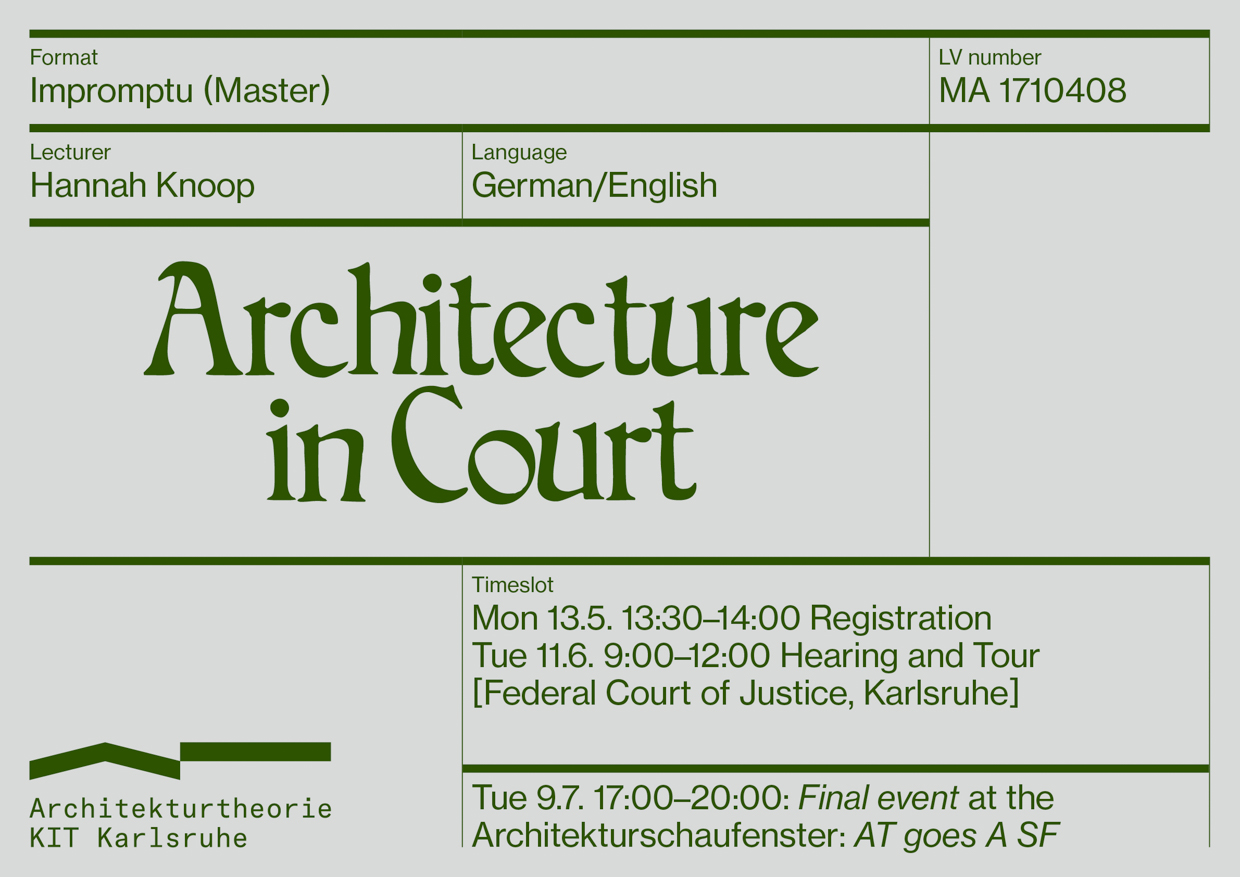
Hannah Knoop
Let's go to court! Façades and assembly halls are well-known architectural symbols of power and politics. Yet certain artefacts are often overlooked. We want to take a closer look at the Federal Court of Justice in Karlsruhe, analyse and develop our thoughts on its architectural artefacts with a view to their impact. To this end, we will take part in a hearing and be guided through the buildings. Based on your observations, you will then create visions, utopias, or dystopias for an artefact of your choice. Tell its stories, according to "the medium is the message". The submission is a collage, groups of two are possible.
Open to all Master's students, mandatory for "Architecture of Decision-Making" participants.
Patentnichtigkeit and Artifacts
CTA
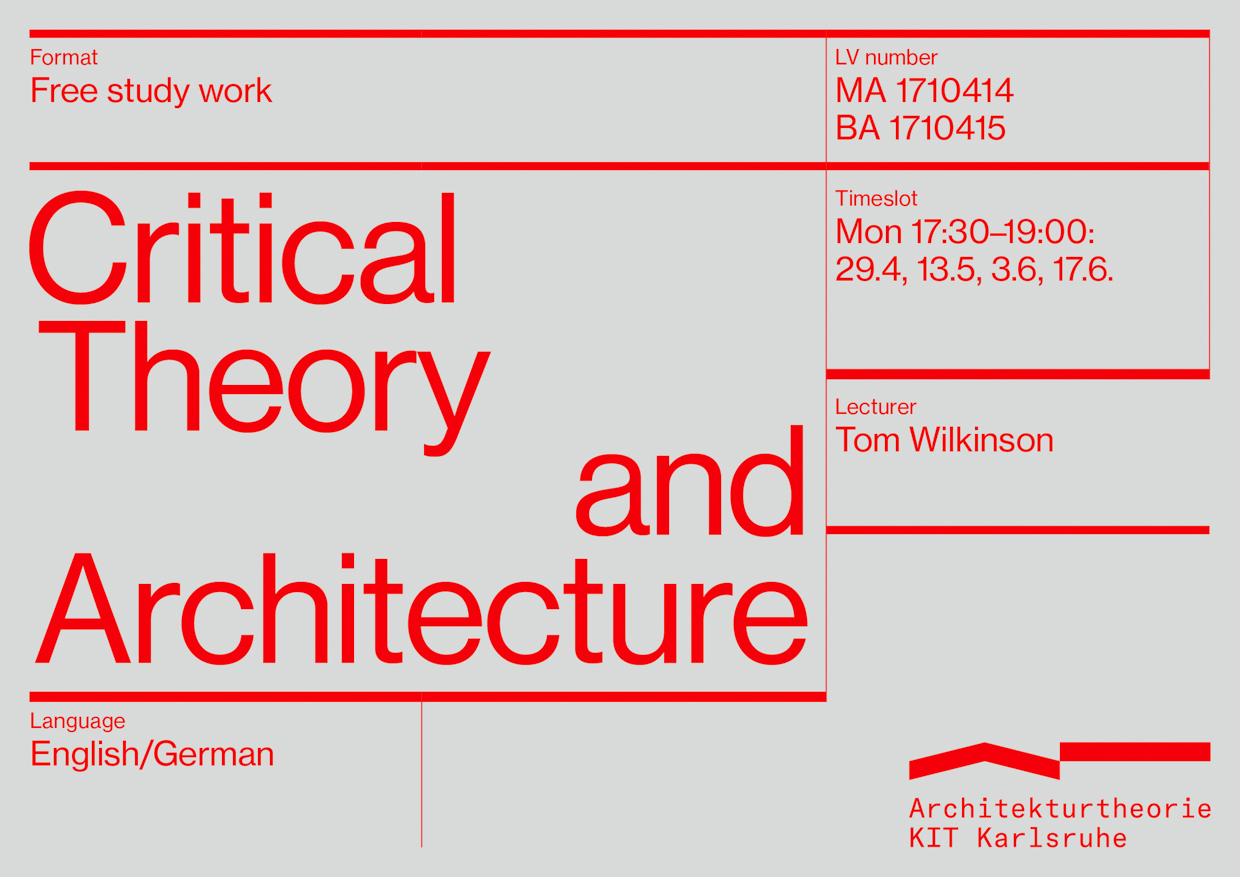
Tom Wilkinson
Critical theory is a tradition of thought that began 100 years ago in Germany: it is the argument of this lecture series that it is still useful for thinking about architecture today. Beginning with Siegfried Kracauer, a trained architect and frequent writer on the subject, and Walter Benjamin, who obsessively worked on the Parisian arcades, we will move on to their postwar descendants such as Jürgen Habermas, Manfredo Tafuri, and Angela Davis, exploring these thinkers' critique, their disputes, and their limitations.
CBRA
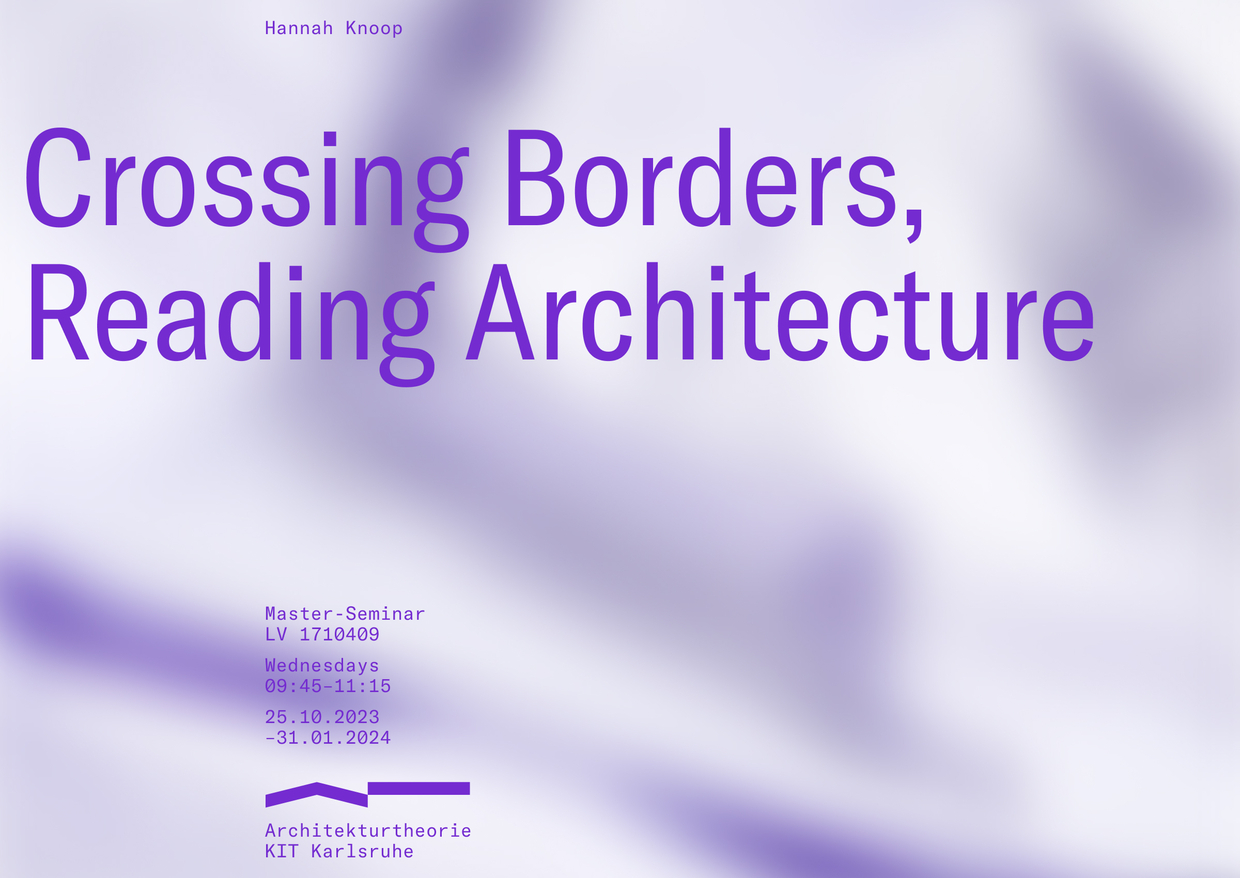
Hannah Knoop
Borders not only separate realms, nation states and territories; they drastically demonstrate global inequality - from the dream of cosmopolitanism for some to the reality of the "sorting machine" and fortification for others.
How exactly do historical and current border architectures, even beyond walls, fences and surveillance towers, look like? Who designed them? What architectures shape borders? Through "deep reading" of selected texts from architectural theory, sociology or post-colonial studies, these and other questions will be addressed and discussed.
The seminar is designed as a reading seminar and can be extended in the summer semester in cooperation with EPFL Lausanne and/or a research project.
MWS
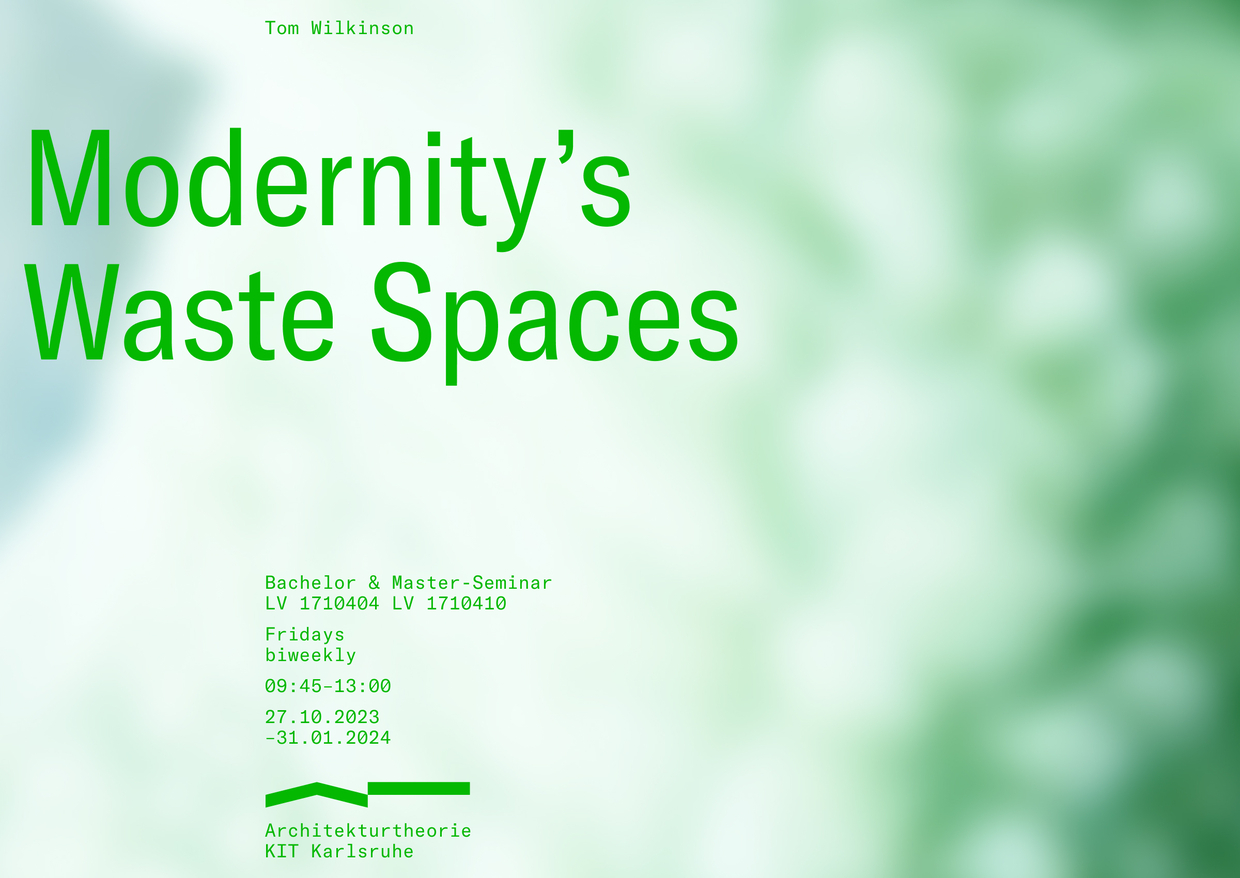
Tom Wilkinson
In view of the problem of modernity’s waste, this seminar will focus on modernity’s waste spaces: dumps, sewers, camps, abandoned malls, etc. These are by-products of modernisation and production sites/repositories of modernity’s refuse, including its ‘human waste’, to use Zygmunt Bauman’s (problematic) phrase. Though excluded from the canon and from modernist spaces themselves, these are in fact co-constitutive: modernist space and modernity’s waste spaces produce each other.
We will analyze sources in various media and examples from around the world. In view of the fact that modernisation is a dialectical process, we will also look at designers’ attempts to reform and reuse waste spaces.
RP
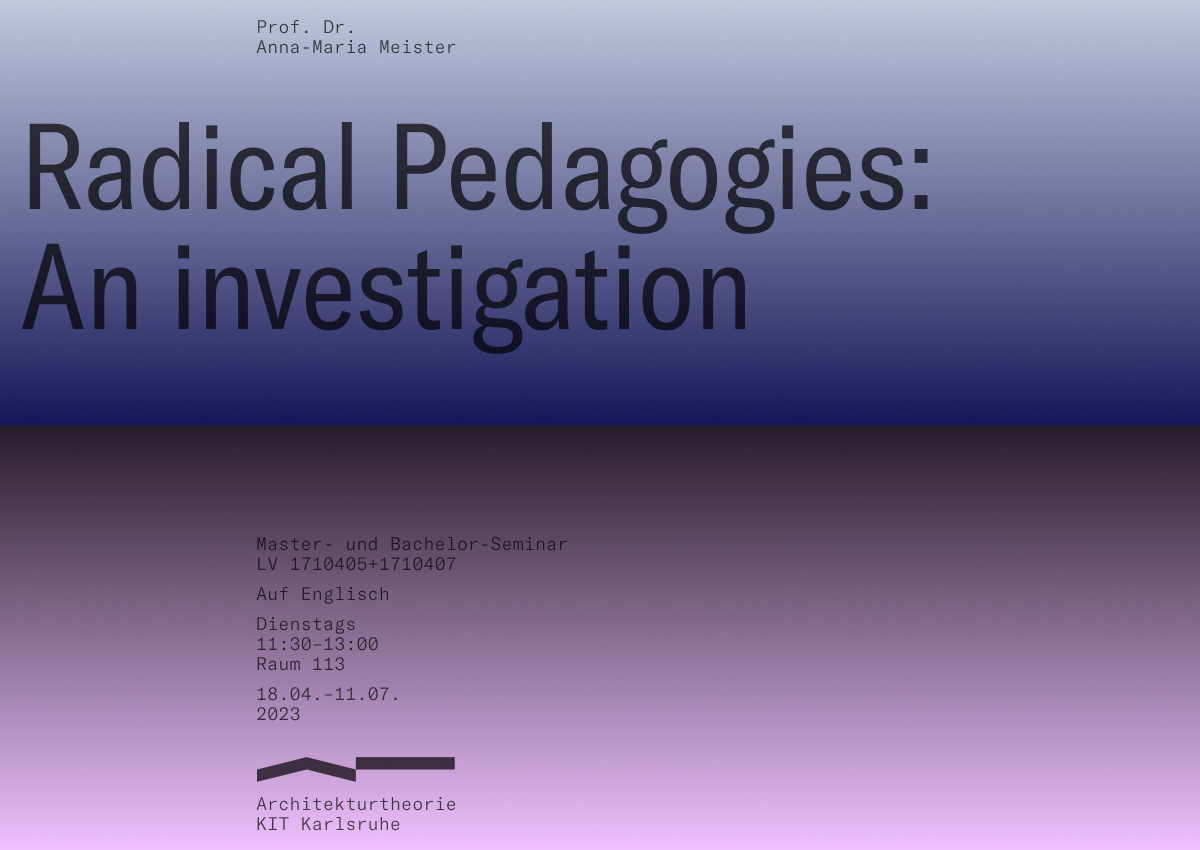
Anna-Maria Meister
In this seminar we will discuss the transformation of architectural education after World War II and its impact on today’s challenges alongside the recently publisched book “Radical Pedagogies” (MIT Press 2022). The historical case studies and efforts to defy architecture’s status quo will serve as testing ground against pedagogical strategies we might employ today. These radical experiments sought to upend disciplinary foundations and conventional assumptions about the nature of architecture as much as they challenged modernist and colonial norms, decentered building, imagined new roles for the architect, and envisioned participatory forms of practice. Although many of the experimental programs were subsequently abandoned, terminated, or assimilated, they nevertheless helped shape and, in some sense, define architectural discourse and practice. Viewed through their dissolution and afterlife as well as through their founding stories, these projects from the last century raise provocative questions about architecture’s role in the new century. The language of reading and discussion is English.
AS
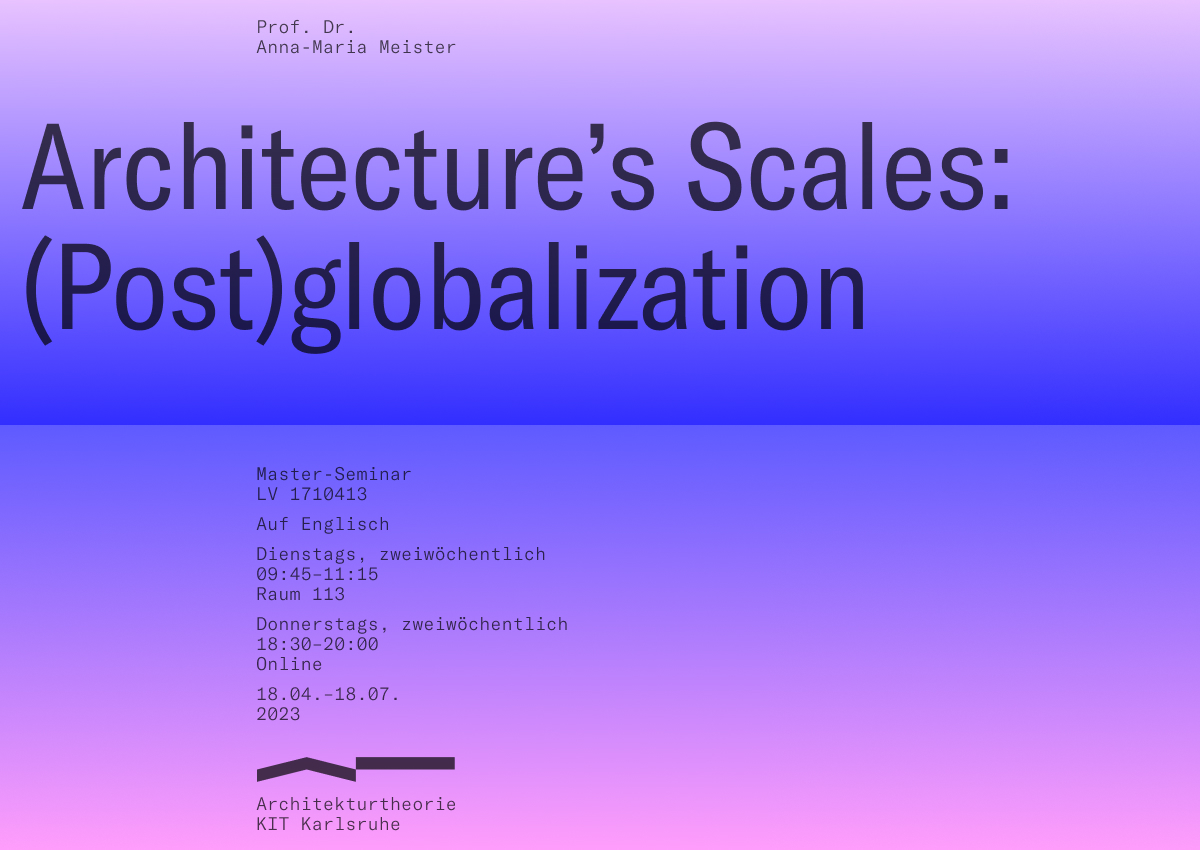
Anna-Maria Meister
Architecture’s scales are not limited to buildings, as architecture’s effects are not limited to structure or aesthetics. Rather, the impacts and effects of built environments range from molecular particles to global logistics of extraction, from human bodies constructing and maintaining it to regional effects of demographic shifts or cultural appropriations. In this seminar, we will approach these impacts and effects by looking at different scales of modern and contemporary society. We will discuss both the emergence and the currently unfolding crisis of the established structures of globalization, solidified by economy and shattered by wars and mass displacement. To do so, we will examine six case studies ranging from community to the colony to transnational networks.
The seminar will be taught in collaboration with Prof. Dr. Alla Vronskaya, the chair of Architecture Theory and History, Kassel University. Meeting together biweekly in person (connecting online to the other group), we will discuss a text by a leading contemporary scholar or theorist of architecture, followed by an evening lecture and discussion session with the author of the respective text. The language of reading and discussion is English.
AE
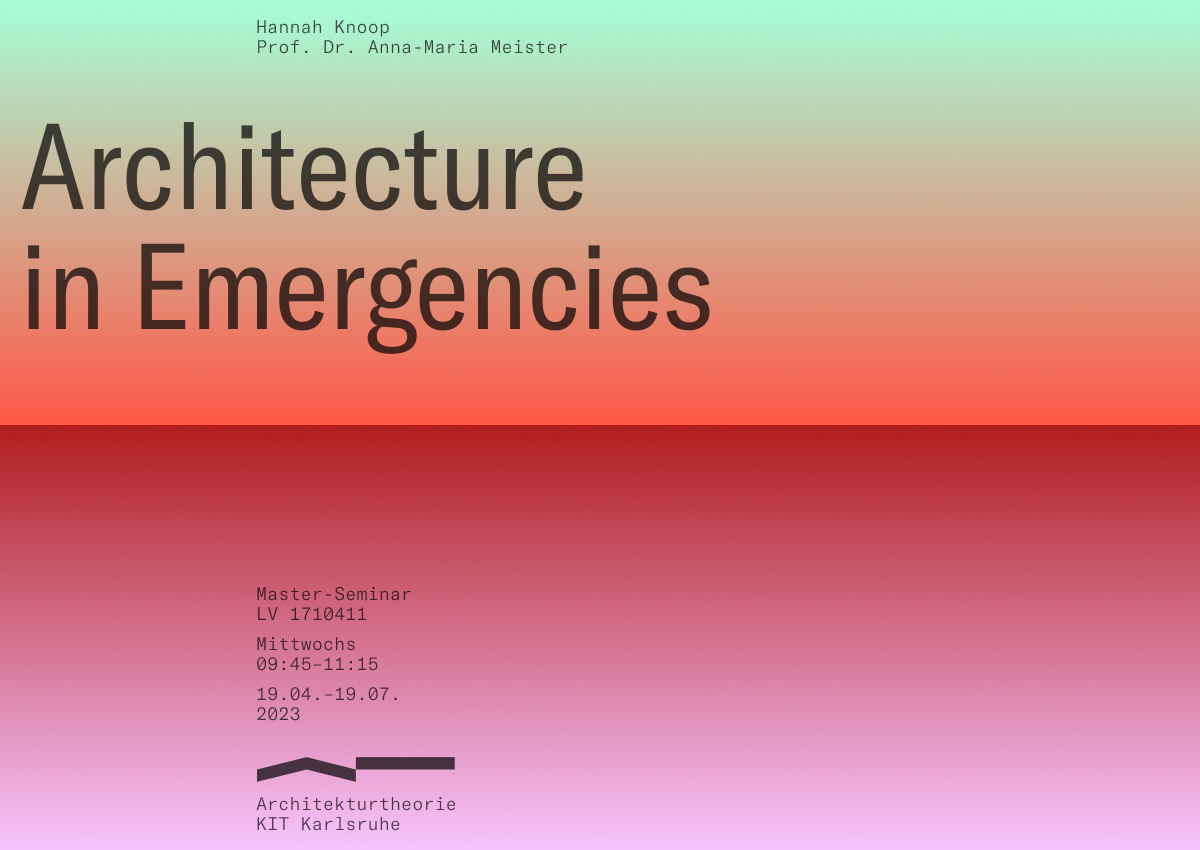
Hannah Knoop
Emergencies are everywhere: they have a global impact and are usually triggered by global ecological, economic and social factors.
The first action in an acute emergency is a roof. It is followed by walls and other architectural elements - according to the UNHCR's Handbook for Emergencies, the "bible of camp planning". Even on a larger scale, architecture and urban planning play a crucial role in crisis. But how are emergencies defined? Who is involved in planning and design? Which architects have designed standards for emergency situations?
The seminar is designed as a reading and research seminar on projects and offers a forum for intensive exchange among each other.
SDLLS
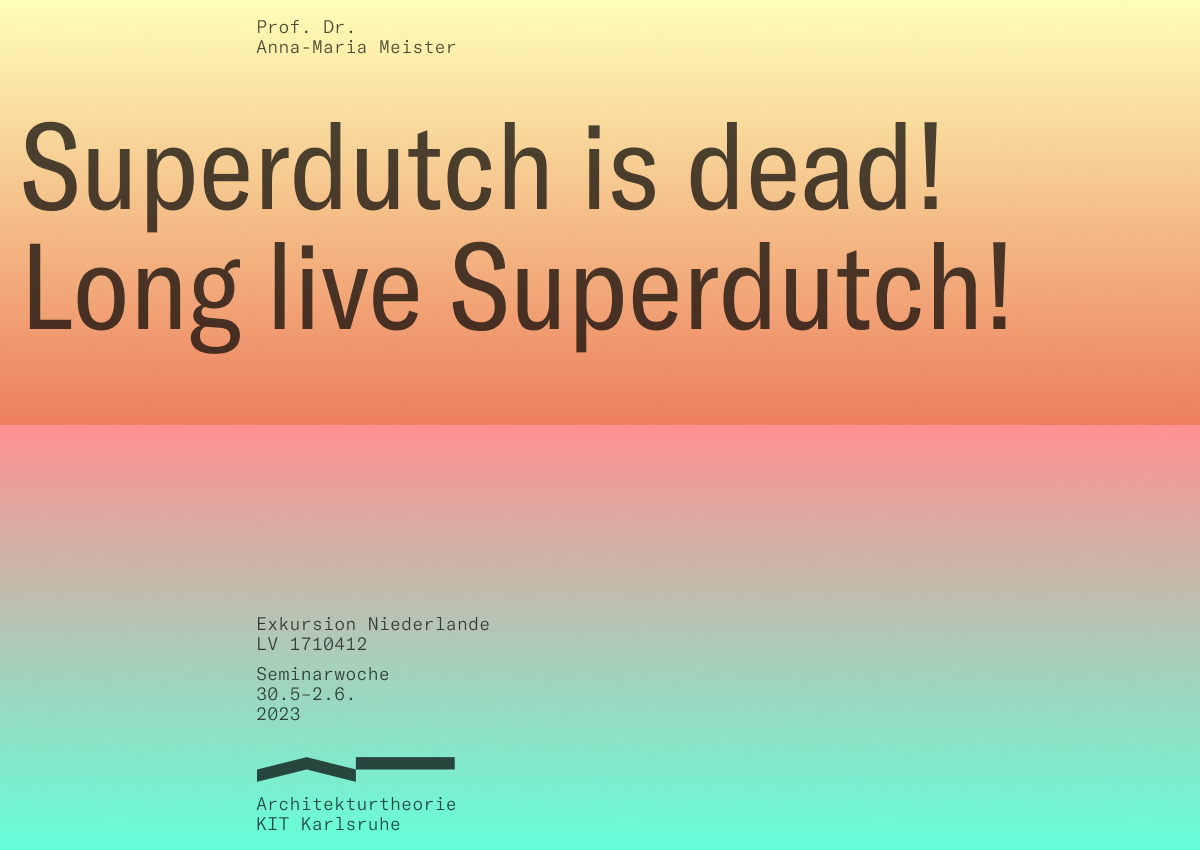
Anna-Maria Meister, Hannah Knoop
In a historical overlay, we will repeat a 1999 KIT excursion to the Netherlands during the seminar week. With original slides, timetable and the original selection of built examples we will compare the aging processes, urban and demographic changes and appropriations with 1999 on site. Changes in media and mediation of architecture (slides vs. Instagram, lecture vs. TikTok) will be discussed as well as the consequences of the Superdutch wave of the 1990s, which continues to reverberate in master plans and aesthetics today.
SR
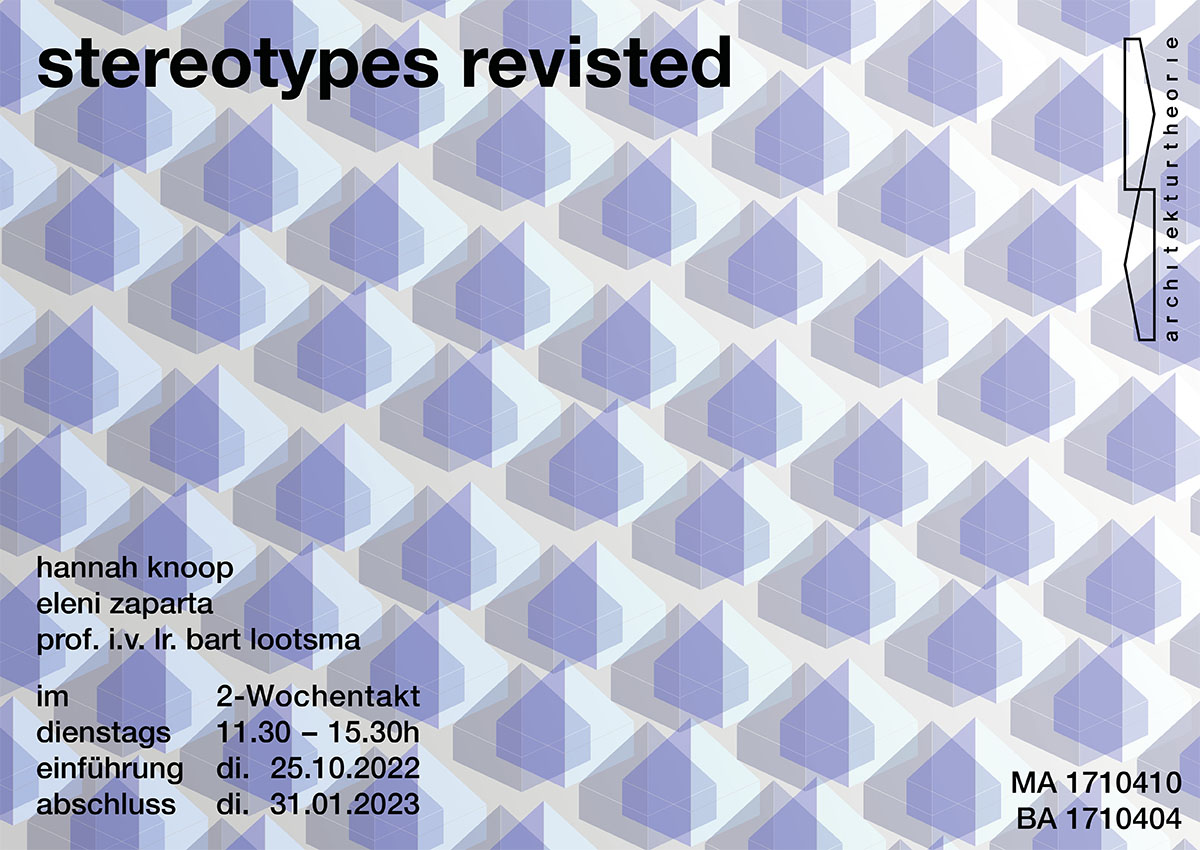
Hannah Knoop, Eleni Zaparta, Bart Lootsma
Stereotypes, patterns, norms and standards shape environment and architecture. Whether through regulations and laws, as design tools or transferred from society's discourses, they provide order and structure. But how do stereotypes come into being? Who shapes them, on what design, social and legal foundations are they built? Architecture can reflect technical and social innovations, but it can also manifest what is long overdue. Both need to be uncovered and questioned.
The event is designed as a reading and research seminar. The aim is to critically explore the dimensions of stereotypes and to observe one's own design based on projects.
RAEA
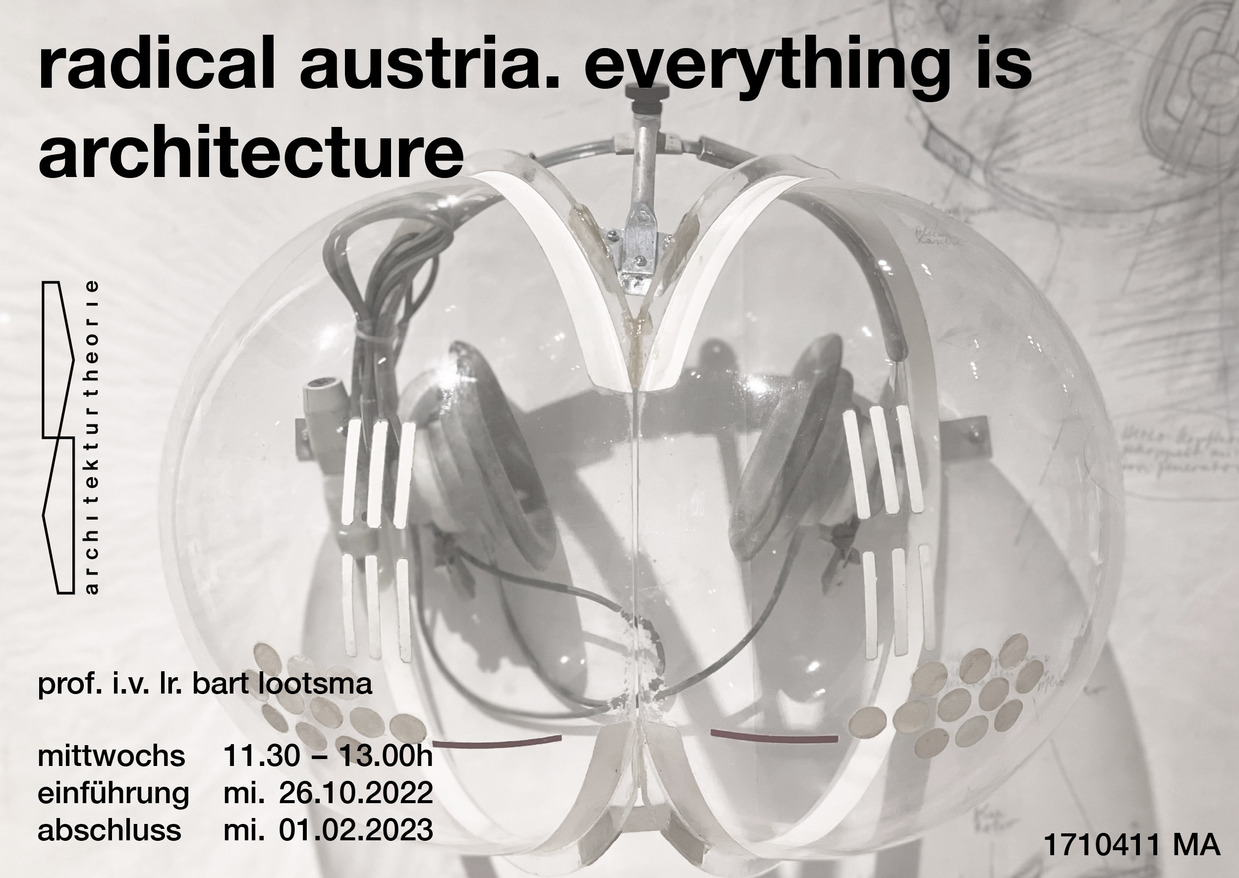
Bart Lootsma
The experimental work of Austrian architectural collectives and designers from the early 1960s to the mid-1970s has been called the “Austrian Avant-Garde.”
This seminar is dedicated to the consciousness-expanding, boundary-pushing and socially critical work of these designers. Works by groups like Coop Himmelb(l)au, Haus-Rucker-Co, Zünd-Up and independent designers and artists like Walter Pichler, Hans Hollein and VALIE EXPORT are a reaction to social and technological developments, but also to the Austrian context. The combination of experimentation and analysis makes the Austrian Avant-Garde one of the most radical movements of the time. Their themes are still relevant today: The examination of the relationship between man and machine, communication versus isolation, and the desire to create personal bubbles.
ACZ
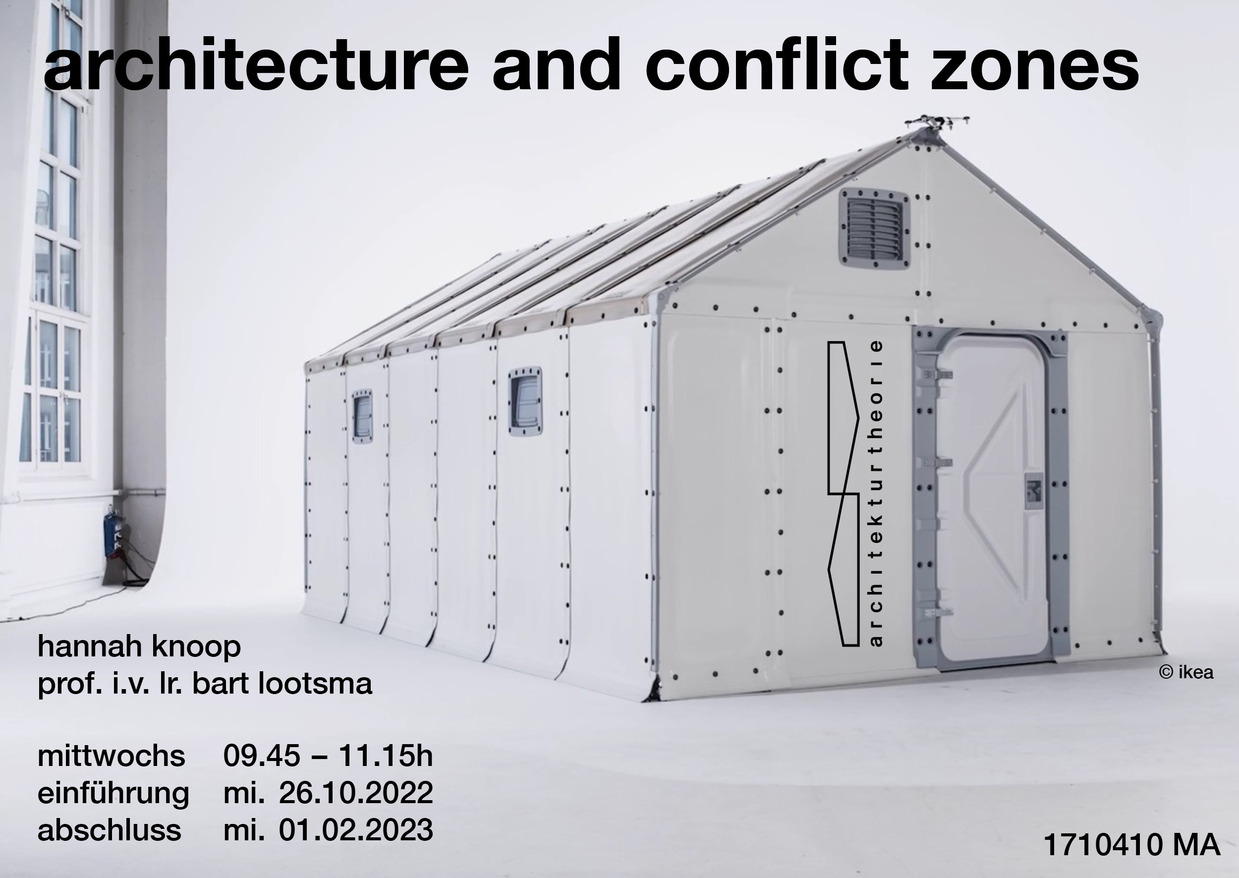
Hannah Knoop
Architecture is a geostrategic and politically contested space. Representative buildings, infrastructure projects or residential and urban space are both the stage and the subject of diverse negotiation processes. Current debates on displacement, war and the climate crisis bear witness to this. What role does the discipline play for political aims such as defense, territory and occupation, as well as for spatial justice and questions of citizenship? How can architecture be understood not only as plaything of geopolitical strategies and more as an active player in the context of human rights?
The seminar is designed as a reading and research seminar on projects and offers a forum for intensive exchange among each other.
WAS
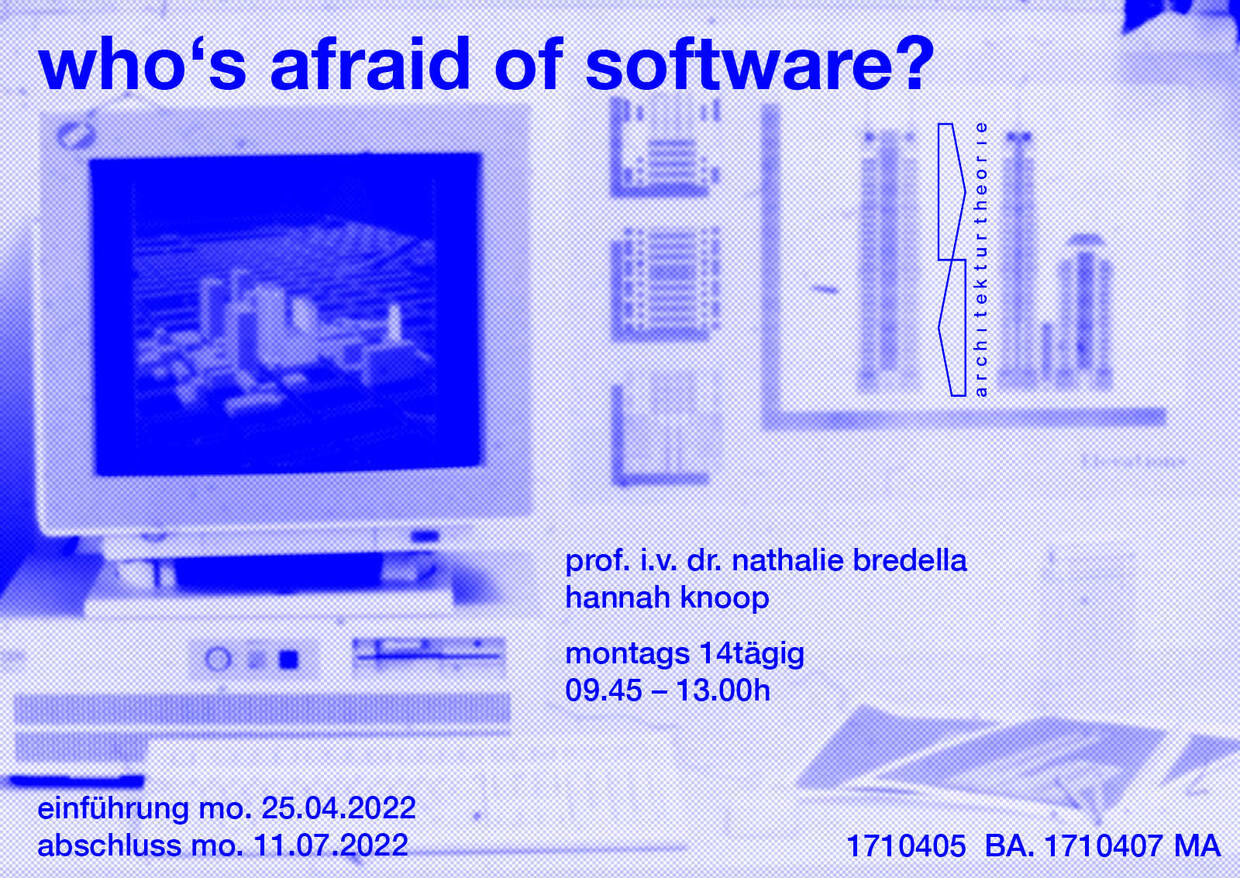
Hannah Knoop
Is architecture still designed 'by humans for humans', or have we long since entered the age of posthuman design? Digital design tools, algorithms and the collection and interpretation of data are increasingly shaping and determining the design process: from the first sketches to realisation and object monitoring. The human factor flows into this as a set of data. The seminar addresses this process and the closely related concerns about the limitation of creativity and the diffuse fear of losing autonomy.
The course is structured as a reading and research seminar. The aim is to use examples to take a critical look at digital design tools and their cultural history.
MDT
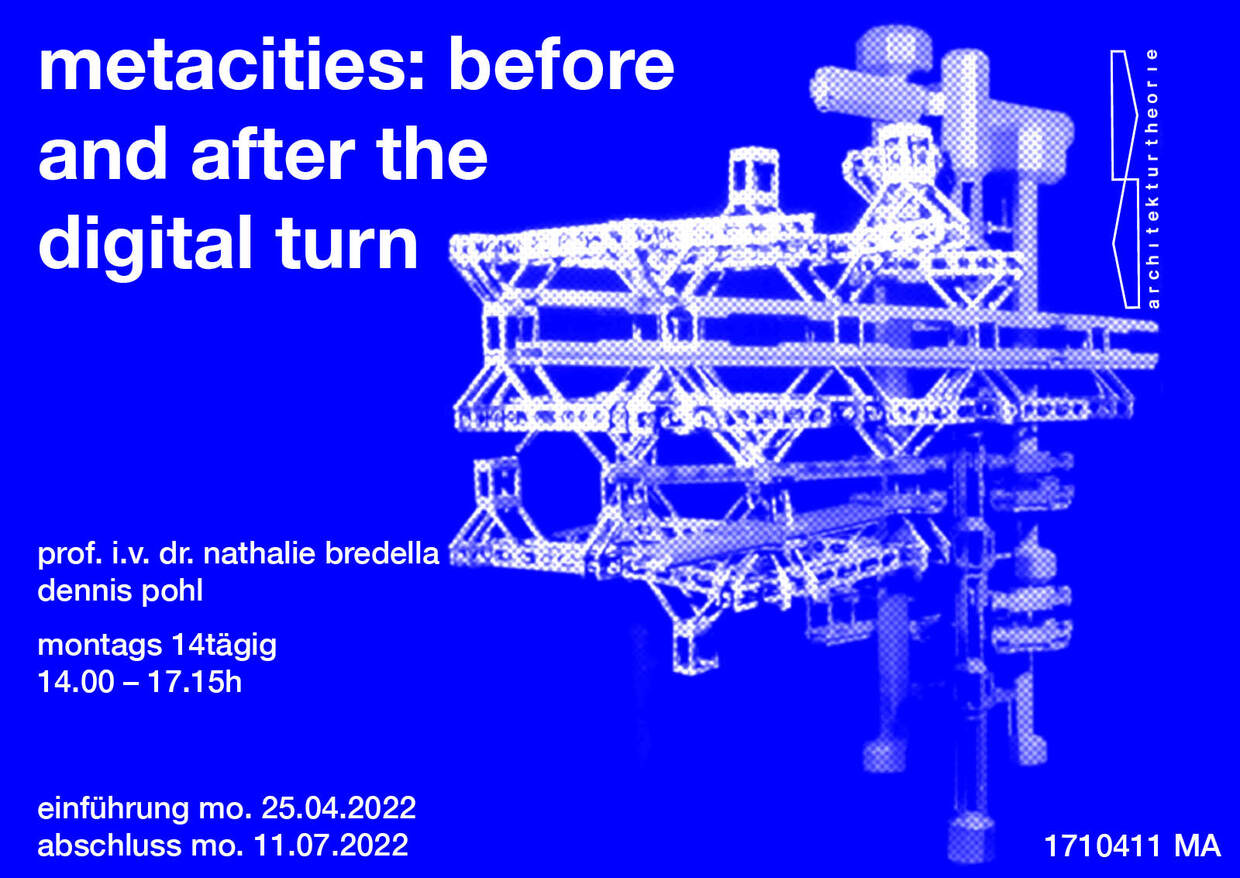
Nathalie Bredella, Dennis Pohl
Today's smart cities realize the metacities of the 1960s and 1970s. User data, movement flows, and adaptability are not only the demands of new smart city designs but already a fundamental part of earlier meta-city planning. In the 60s and 70s, the social itself becomes value and commodity for the built environment. What media, and methods impact architecture from this era until present day? What are the origins of the economization of the social in cybernetic urban planning?
The course is structured as a reading and research seminar. The aim is to take a critical look at the history of the digitalization of smart cities, and to question the effects on today's urban planning.
GP
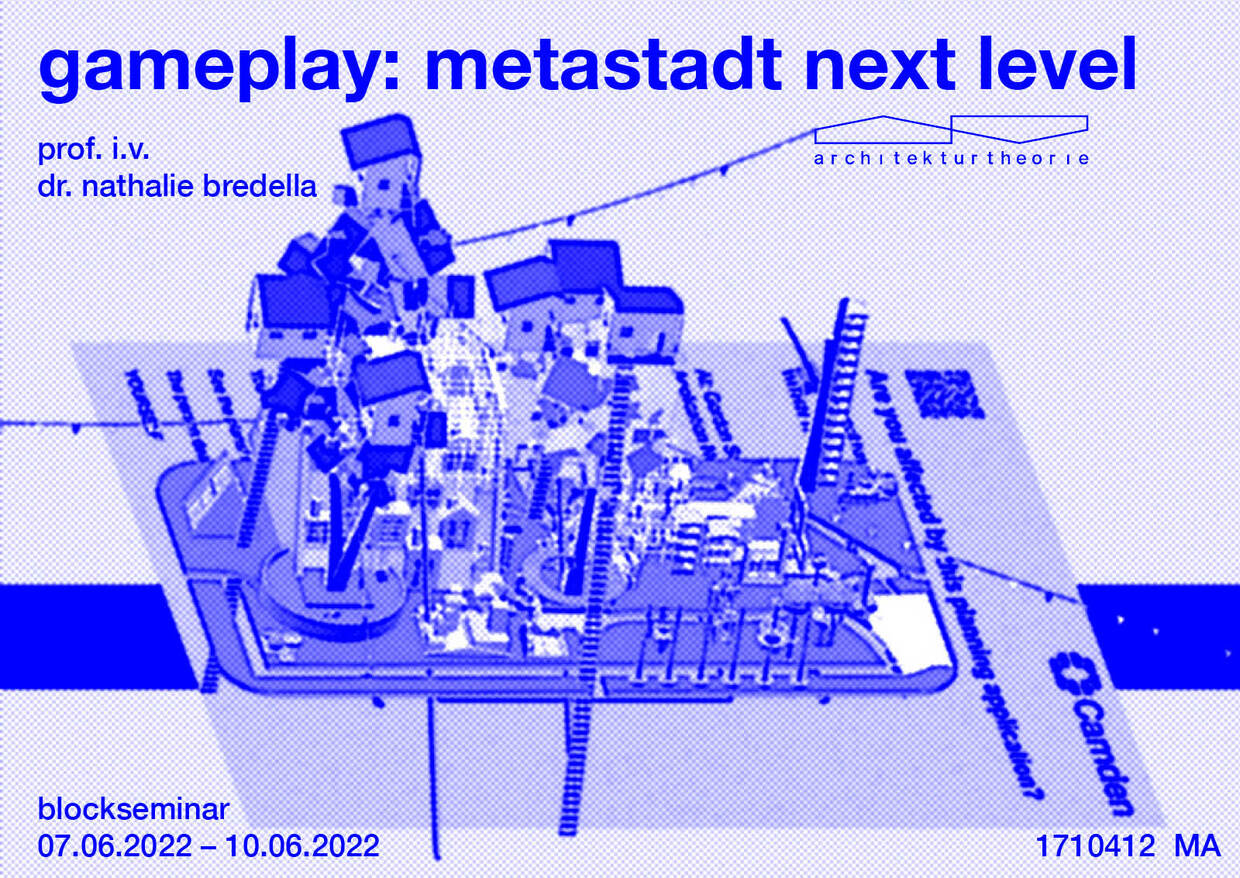
Nathalie Bredella
Urban games imagine alternative futures, while experimental designs (Metastadt, R. Dietrich) use game rules and playful processes in the context of planning. This seminar explores the interplay of gaming and planning and deals with ideas of architecture and the city inscribed within game systems and 'enacted' through gameplay. Together we will explore game mechanics and develop interactive electronic installations that test the feedback between planning strategies and play.
HS
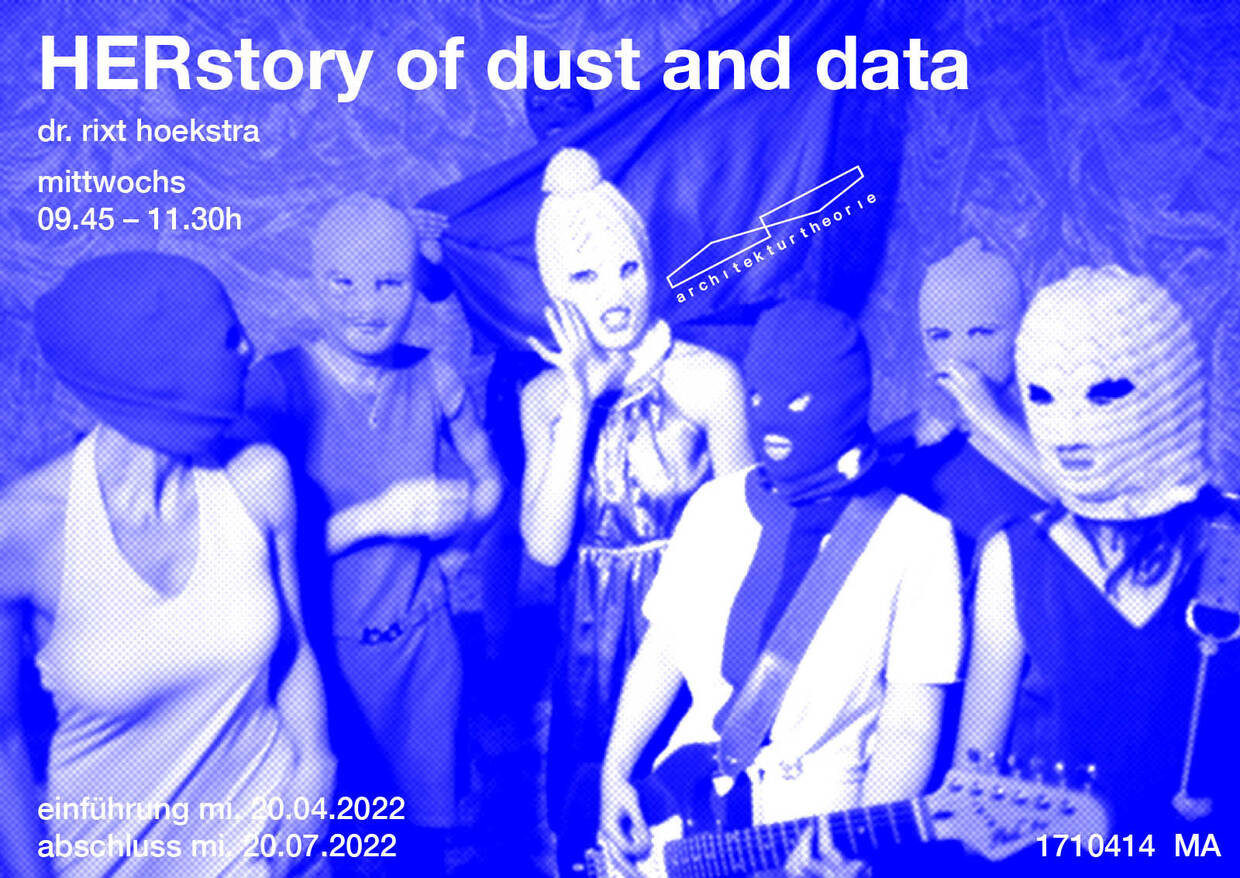
Rixt Hoekstra
Archives are neither neutral nor stable institutions but political entities themselves. The writing of architectural history, in turn, is dependent on material found in archives. Categories of archiving thus contribute to the marginalization of female architects in architectural history, as their designs and texts have not been systematically collected. This is the point of departure for this research seminar. We will visit several archives, and ask which criteria are in place when collecting data about architects, and how to discover data about female architects and their activities. We propose to think of archival work as a potential form of activism within architectural discourse.
AD
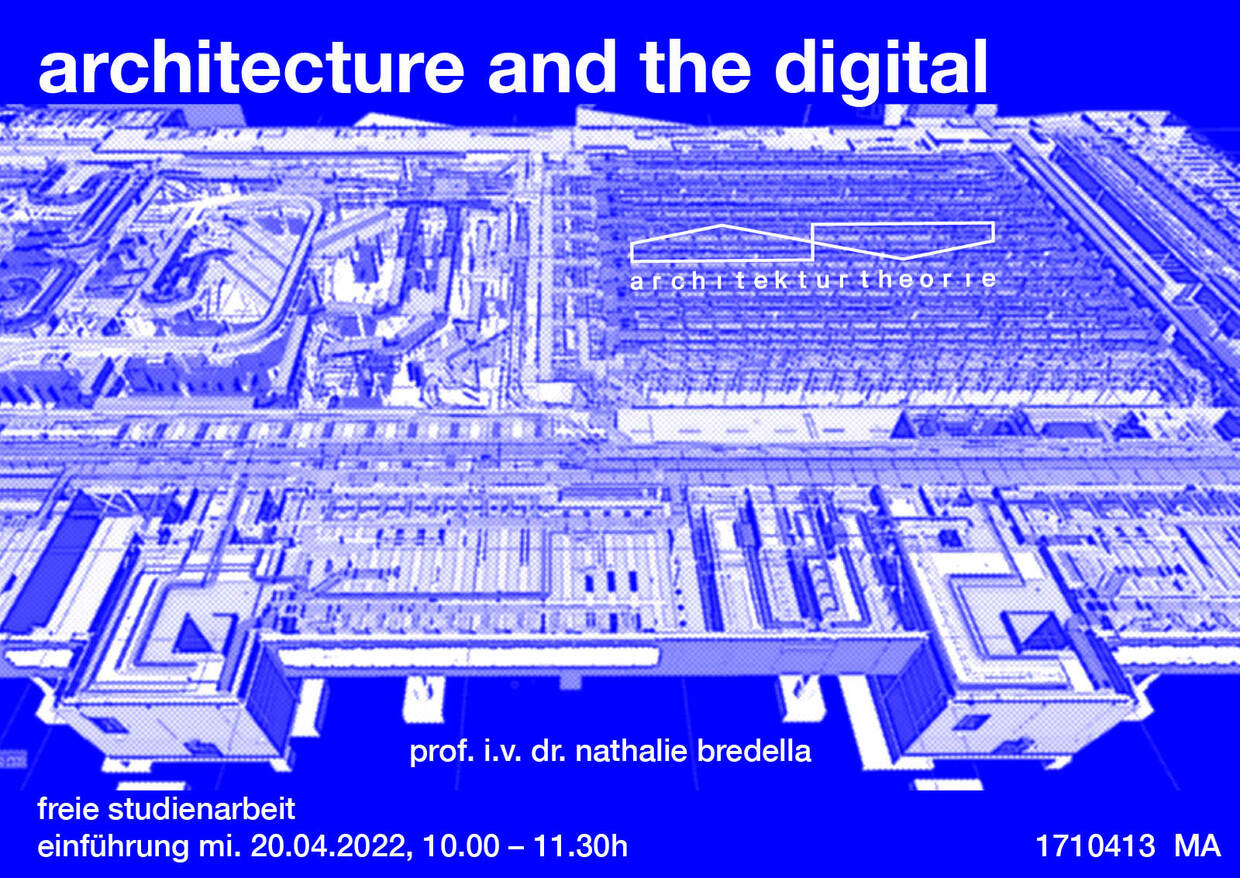
Nathalie Bredella
The formulation of research questions as well as methodological approaches are the focus of this research seminar, which deals with selected topics of digitization in architecture, visualization techniques and the agency of (digital) tools in design.
IPA
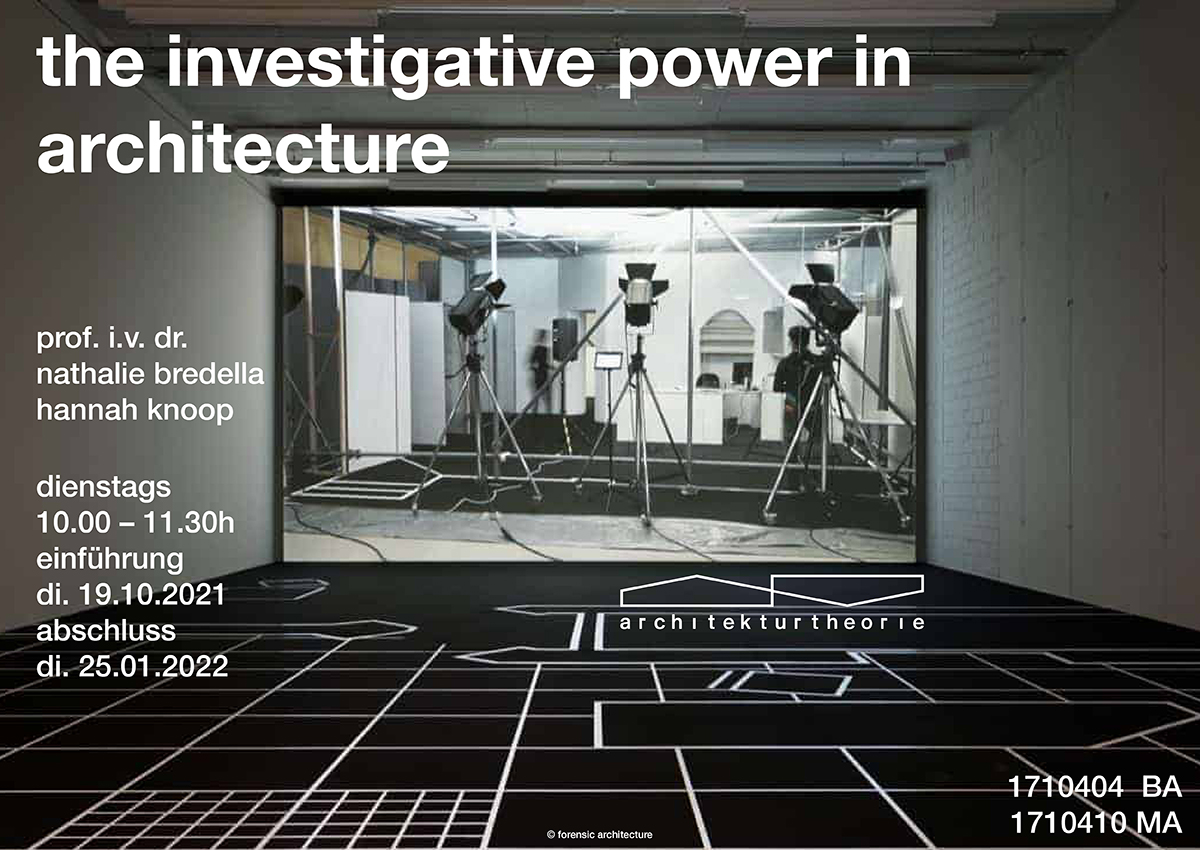
Hannah Knoop
Architecture is a material witness. Its interrogation reveals social structures and provides crucial evidence for conflicts and progession of events. Investigative research of built objects combines spatial strategies from architecture with forensic and journalistic methods. They serve to uncover and reveal power relations and power structures, as shown in works by Forensic Architecture, Alisson Killing among others.
The course is designed as a reading and research seminar. The aim of the seminar is to engage with the new forms of collaborative truth-finding and architecture as investigative practice, to question them critically and to classify them historically.
AOS
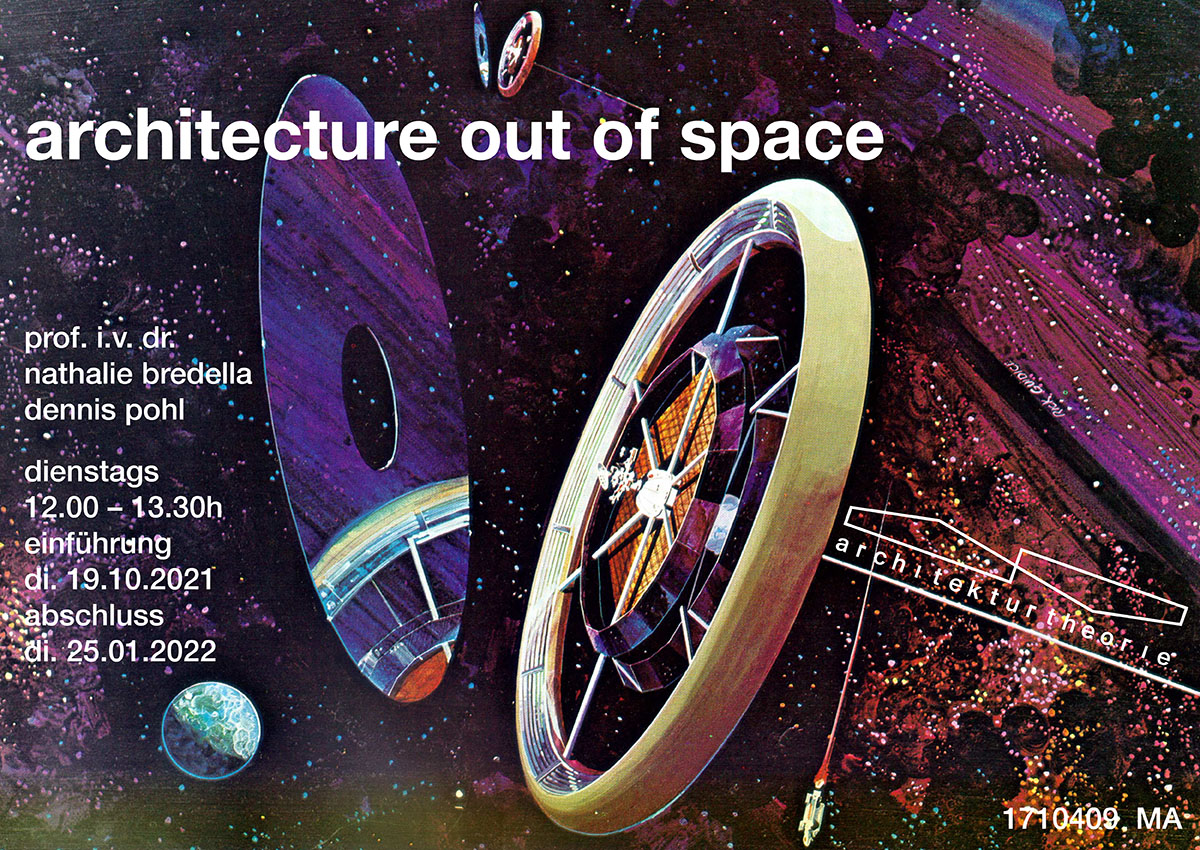
Dennis Pohl
Architecture plays a key role in the design of outer space. Satellites, space capsules or space colonies are not only objects of science, but also the planned artificial envirnoments by designers. Beyond providing ideas about space, as an emergency exit, metaphor or utopia, these designs convey how the earth is understood in ecological, technological and political terms. How can life be considered outside of earthly conditions? The aim of the intensive reading and research seminar is therefore to deal with the interactions between architecture and outer space using selected spatial theories from the history of media, science and arts.
DP
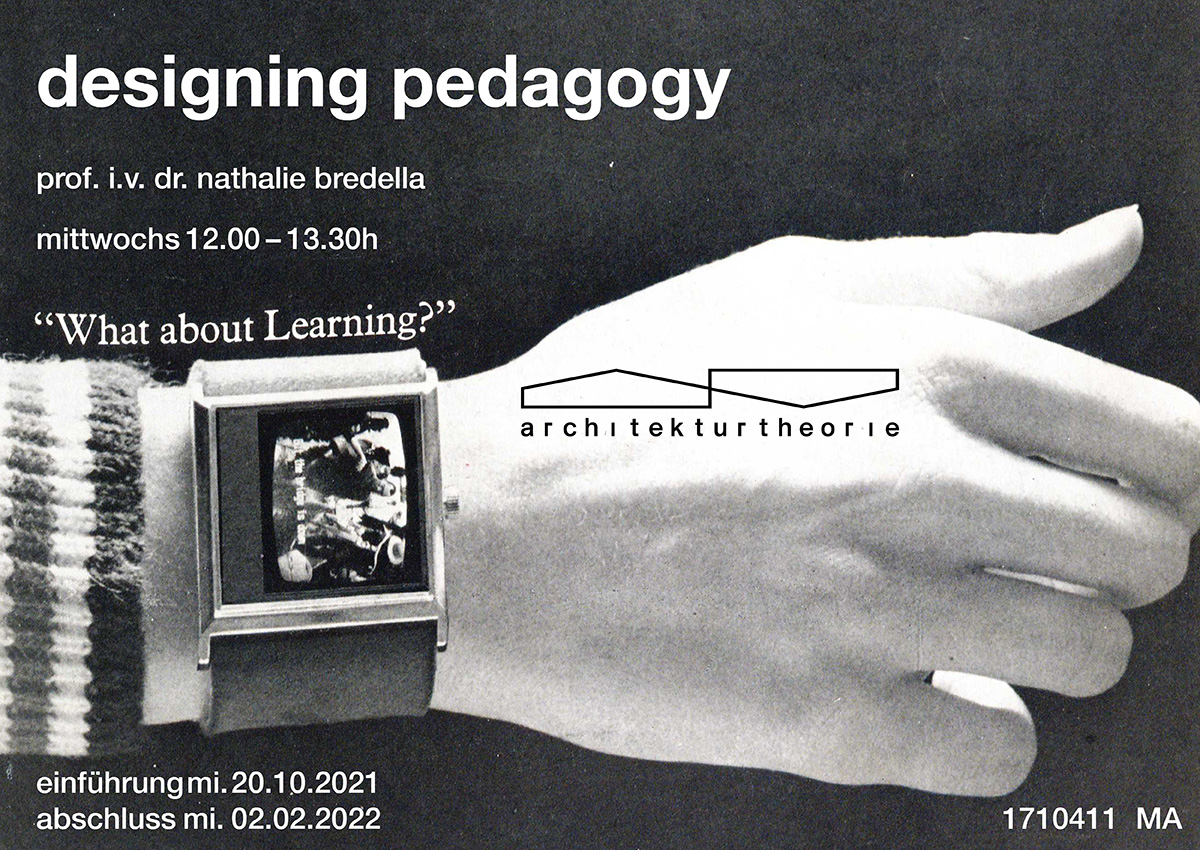
Nathalie Bredella
As universities move classes online, questions are raised about the interrelations between the university’s infrastructures and forms of knowledge production. Rethinking the mandate of education through the media, the seminar discusses the discursive spaces that condition the reading, thinking, and perception of knowledge: the constellation of lecture halls, laboratories, and libraries, which increasingly intertwine with technical networks since the 1960s. Using case studies and reading architectural theory, we will explore how the entanglement of digital and built space conditions the self-understanding of the sciences and speculate about future media constellations in the context of the university.
DG
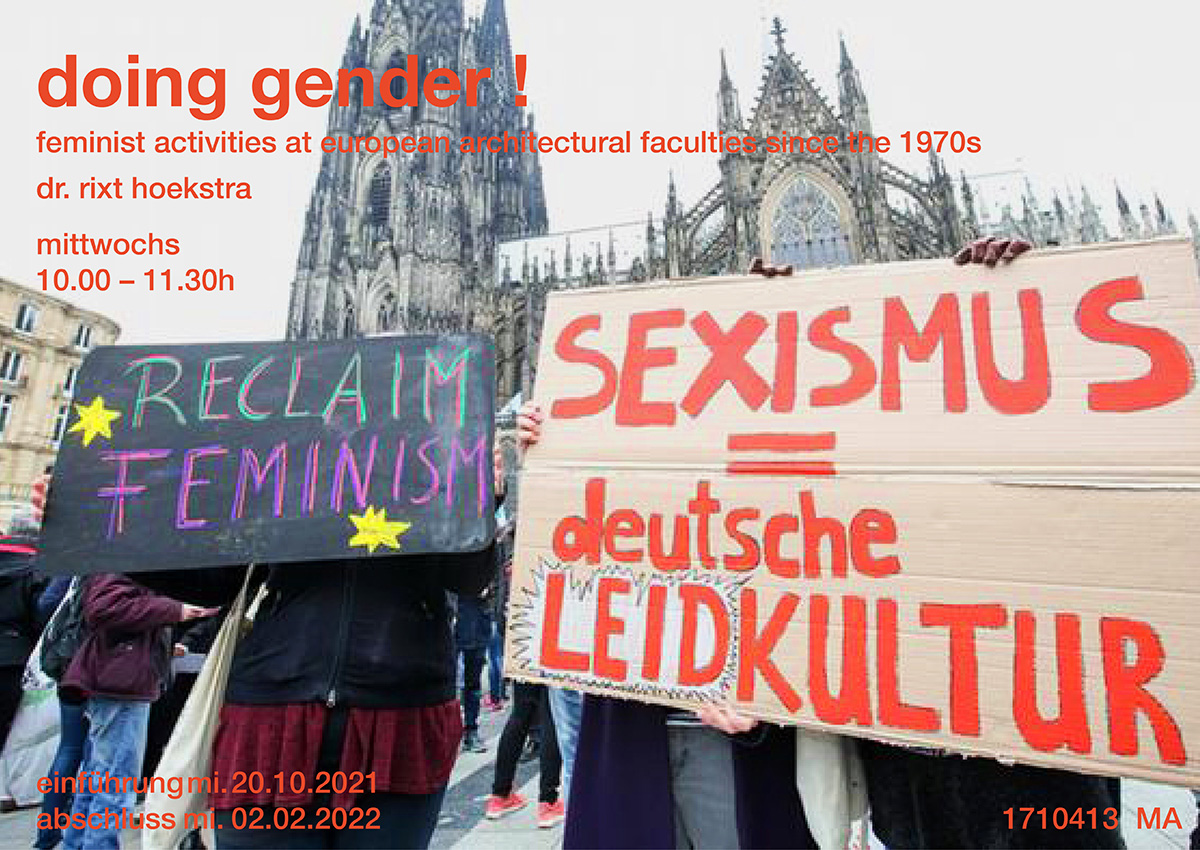
Rixt Hoekstra
Architecture affects everyone. But while societal calls for an open debate about feminism, gender, race, and class have come to the fore, German architecture faculties remain (suspiciously) quiet. Taking this situation as a starting point for discussion, this seminar focuses on the history of feminist’s critiques, and methods of “doing” and activism. We will examine feminist movements in the Netherlands and Germany that were questioning mass housing standards during the 1980s: visiting archives in Berlin, Karlsruhe, and Rotterdam, conducting oral histories, and asking what "doing gender" means today.
AD
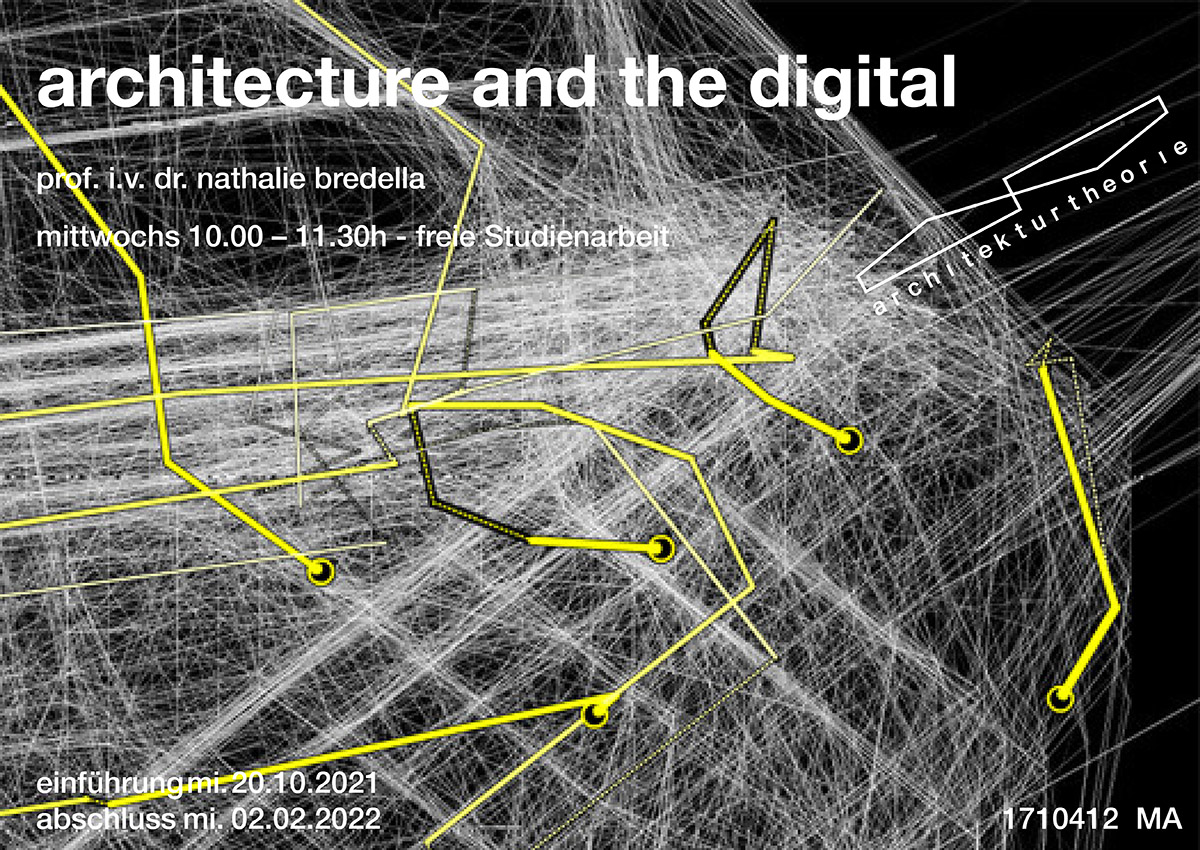
Nathalie Bredella
The research seminar deals with selected subjects on the topic of architecture and digitization. Topics reflect on the tools and materiality of computational design, situating them in a historical context.
AGG
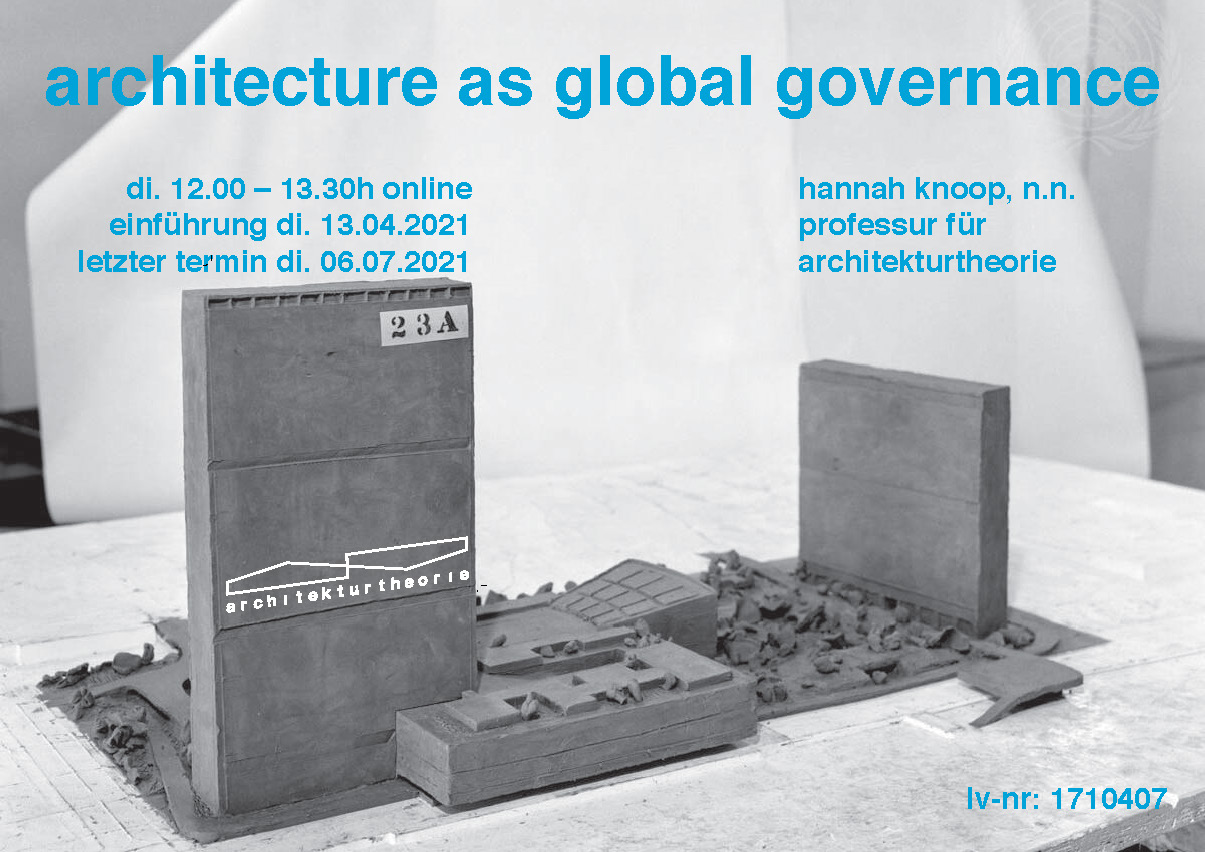
Hannah Knoop
Architecture forms global society. The Palace of Nations in Geneva and the UN headquarters in New York are not only architectural icons, but also symbols of a global community. But the UN is in a crisis: it has to assert itself in a planetary society and stand up to nationalism and populism. How can transnational political aspirations be represented architecturally today? What does it mean to design for a transforming global world community?
The course is designed as a reading and research seminar. The aim is to engage with the aesthetics of global architecture in order to investigate the power and powerlessness of an architecture as global governance.
ADK
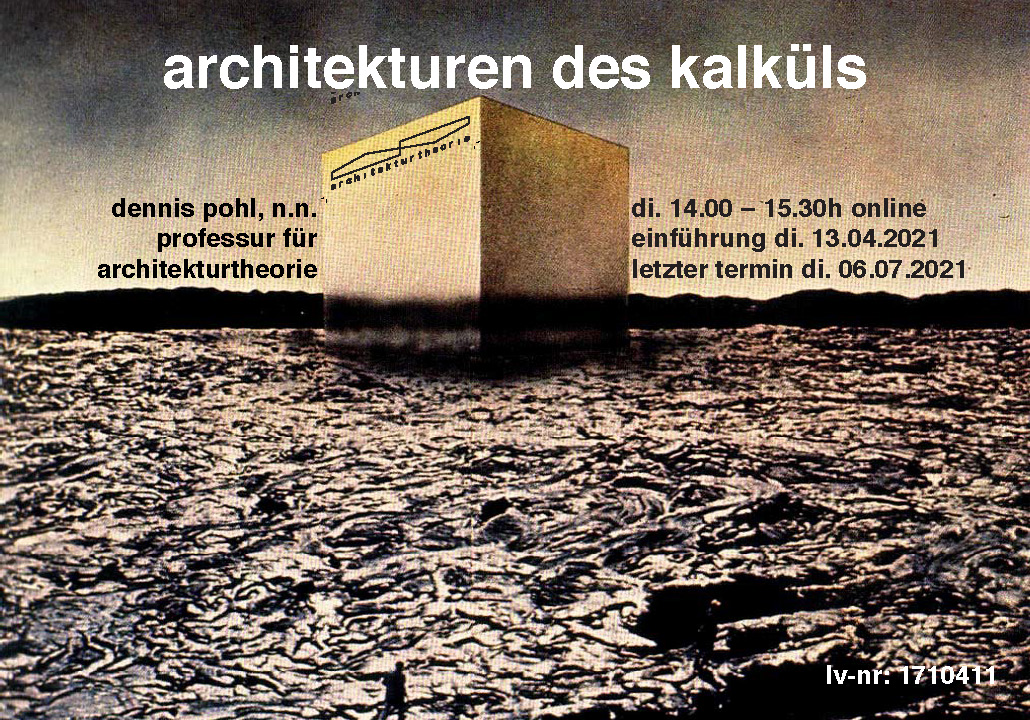
Dennis Pohl
Server farms that calculate everyday life became ubiquitous and indispensable. But the places of calculations have their own architecture history, that remains largely unconsidered. From the court of auditors until the data centers, no calculus can deal without the spaces where mathematical operations happen. This seminar analyzes the places of calculating regarding their impact on social relations. What characterizes these typologies? Which mutual relation exist between them and what is calculated?
This event is conceptualized as a reading and research seminar. It consists of engaging with the architectures of the calculus and revise these with literature from media theory.
DAZ
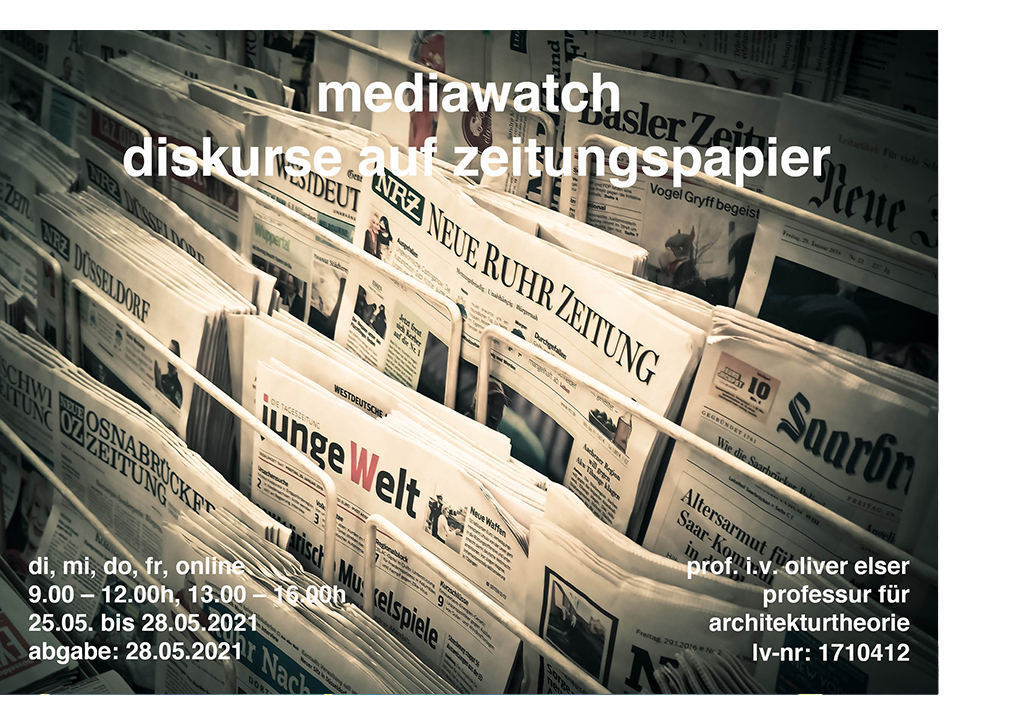
Oliver Elser
What has a wider impact on architecture: The discussion about tax reliefs for commuters? An engaging article in the culture section? Or the reactions to the squatter movement?
In this 4-day block seminar we will explore the relevance of architectural discourses by reading newspapers together, unfortunately only in online archives due to the pandemic. The frame of reference is the 1970s, a time of upheaval. Criticism of mass housing, the reassessment of the old building stock by a broad protest movement, the first signs of the ecology movement: We trace all this in newspaper archives. Goals are: 1. collectively create a collection of key terms, 2. locate key texts, and 3. briefly classify the key texts.
AOT
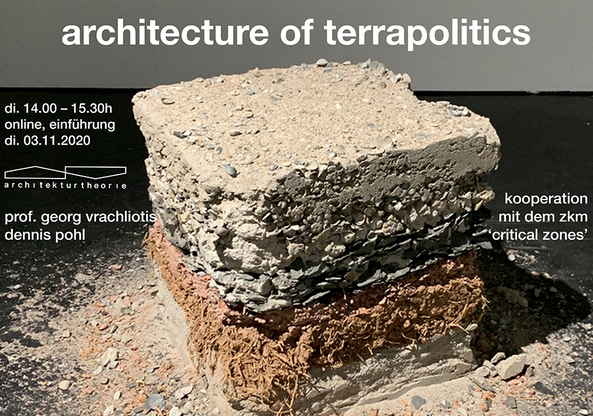
Dennis Pohl, Georg Vrachliotis
Architecture shapes our earth. How buildings are produced and constructed worldwide is a process that no longer takes place only on the surface of the earth. The earth has long since been digitally re-mapped in order to extract sandstone, iron, copper or lithium using complex processes and prepare them for the building industry. Raw materials are becoming a politically contested geological capital of global architecture. But how are architecture, raw materials and digitization related? And what is the geological footprint of architectural production?
The event is organized as a reading and research seminar. The aim is to explore the spatial, material and media theories of current ecological discourses.
TDC
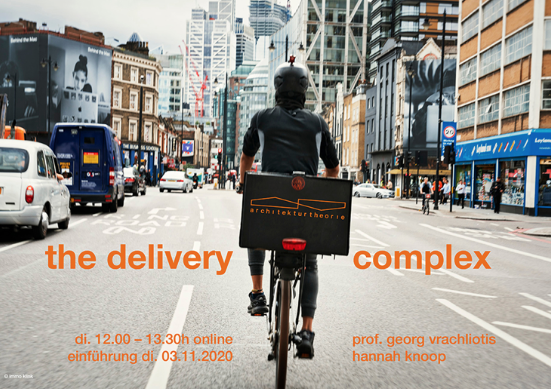
Hannah Knoop, Georg Vrachliotis
Everything seems deliverable: whether books from Amazon, shoes from Zalando or the menu from Deliveroo. Things and food are ordered and delivered to the front door. Goods, capital, platforms and people merge into a digital superstructure in which wishes are transformed into orders: "The Delivery Complex". What effects does this have on the city and architecture? And what does it mean to design for such a service-oriented society
The event is organized as a reading and research seminar. The goal is to explore interdisciplinary theories of space and time in order to take a new look at the consequences of the digital service society.
SCA
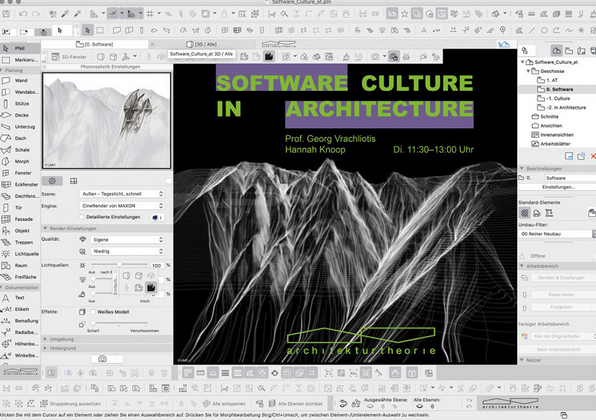
Hannah Knoop, Georg Vrachliotis
Software determines the production of architecture - whether as design tools, methods of rendering and simulation, methods of digital fabrication or management and optimization of complex building processes. Software must therefore be understood in architecture as a cultural and collective phenomenon of "world design", in which technical knowledge is less important than a critical examination of the creative, artistic and political potential.
The course is structured as a reading and research seminar. The aim is to take a critical look at the cultural history of current software in architecture and to ask about the power of digital design tools.
